#anti-smuggling operational deals
Text
Here's more of what's been happening on the ground. (Once again I'm not an expert in war).
Palestinian fighters are still waging war on the state of Israel
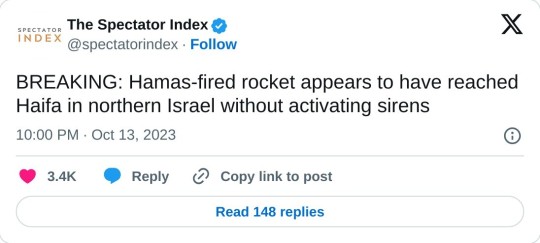
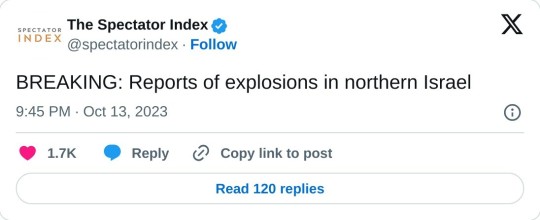


It is clear that Hamas and other groups have access to anti aircraft weaponry and long range missiles, partly from looting Israeli bases but partly from (and this is unconfirmed) from the Russia-Ukraine war. It's not unexpected for weapons to end up smuggled into other countries during a war.
On the other hand, Israel went from swearing it would invade Gaza on the ground to doing just about anything but that
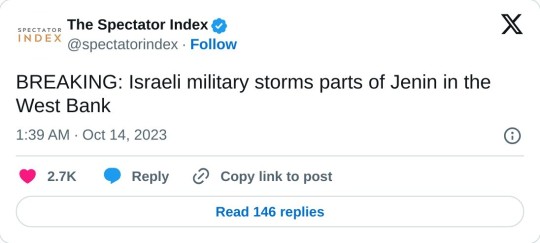
It's understandable why Israel would hesitate even with its 300,000 strong army

IDF is made up of mostly conscripted soldiers who normally act as civilians once they've served their 2.5 year mandatory conscription. Not only that, IDF acts more like a police force than an army. Its soldiers simply don't have the training or mentality to fight militia groups in their home turf.
America itself doubts its capabilities no matter how it words it. This is a country that has yet to win against a guerilla army so it has experience when it comes to this
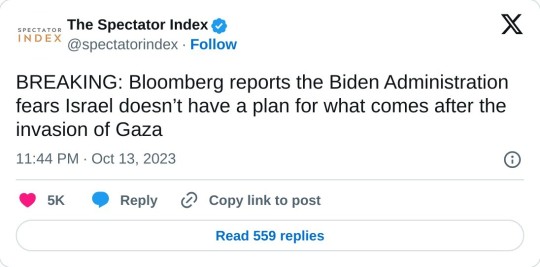
Edit:
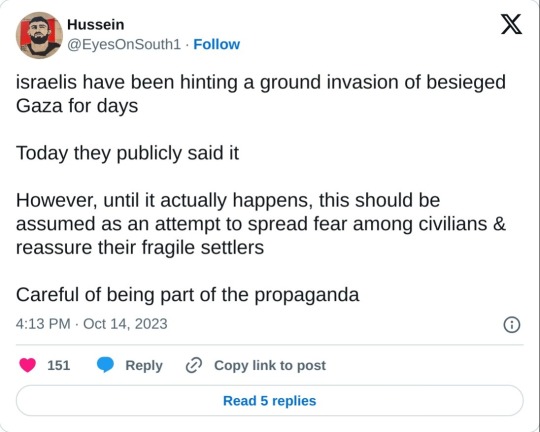

Edit 2: above Hamas states the obvious
In my previous post I highlighted how disorganised the Israel military was in response to Operation Flood Al Aqsa.
This hasn't changed in the days. Israel is behaving more like a cornered animal lashing out than the so called 'strongest army in the Middle East.'
It has been dropping bombs on Syria, Lebanon and Egypt aimlessly, more out of anger than calculated strategy
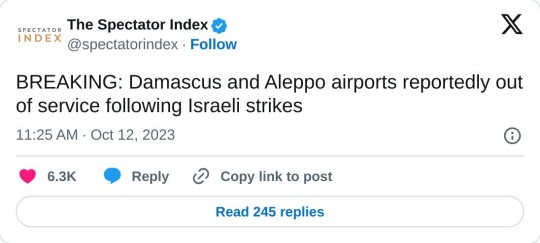
Its efforts to pushing back against the Palestinian militia isn't going well either
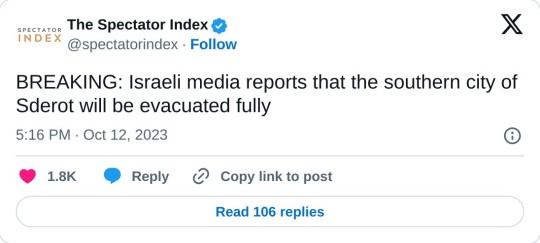
in addition to naked, barbaric cruelty towards Gaza because it is not producing results elsewhere
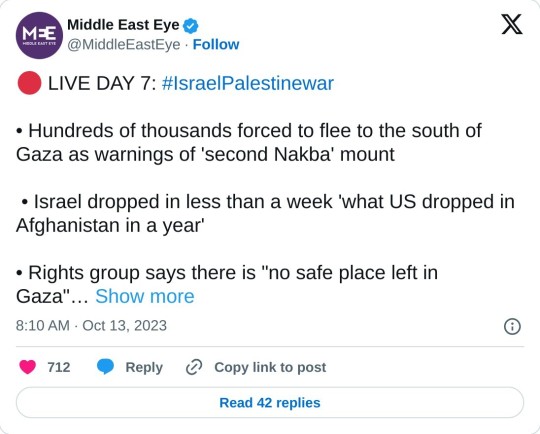
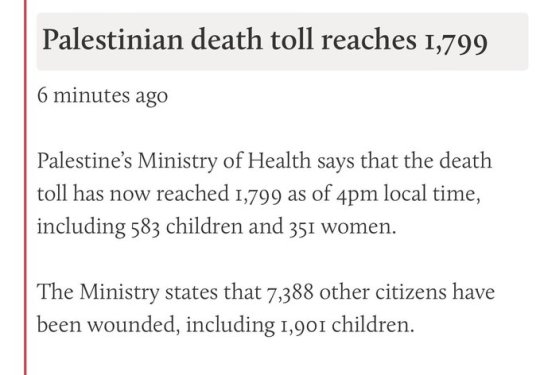
The tweet below is important as Russia is an Israeli ally. The Israeli right wing has been very favourable towards Putin, even willing to disagree with the US and EU policies on Russia. However Israel repeatedly bombing Syria is quickly souring Russia on the country. While Putin doesn't want to go against Israel at this point, he has become increasingly critical of the country in the past couple of days.
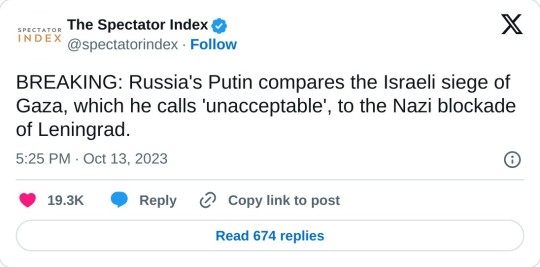
Saudi went from making a half-hearted 'both sides need to stop statements to cutting ties with Israel (ties Israel and America have worked very hard to form) to outrightly condemning Israel's treatment of the people of Gaza.
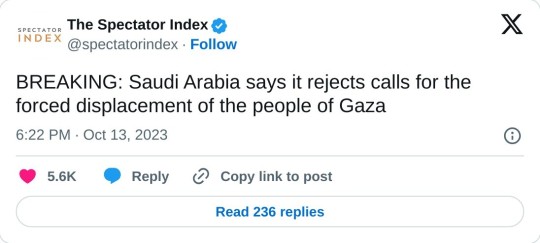
Naturally, with all of this happening, Israel has responded, not with ceasing the bombardment of Gaza, but by killing and assaulting journalists covering the genocide.
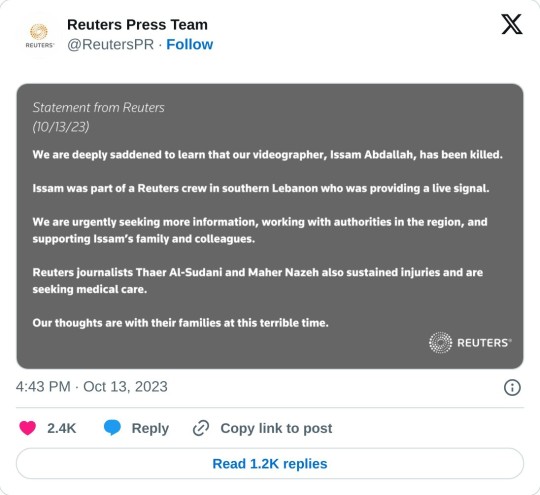
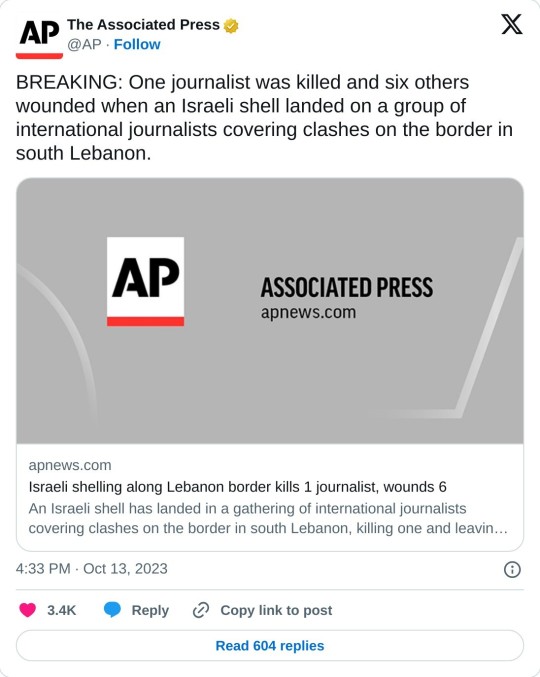
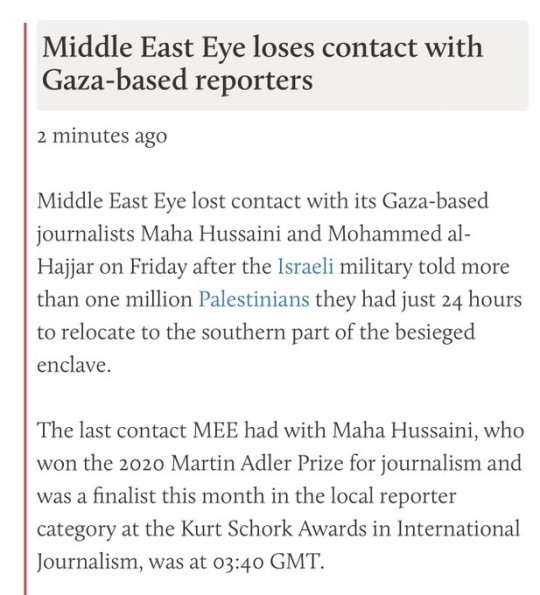
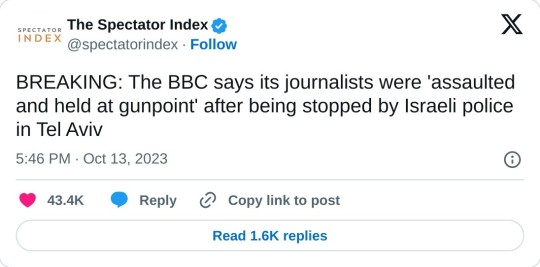
so that it could committ war crimes without it being documented and seen by the world. War crimes such as announcing that they'd bomb a hospital in Gaza and giving doctors and nurses just hours to evacuate their patients.
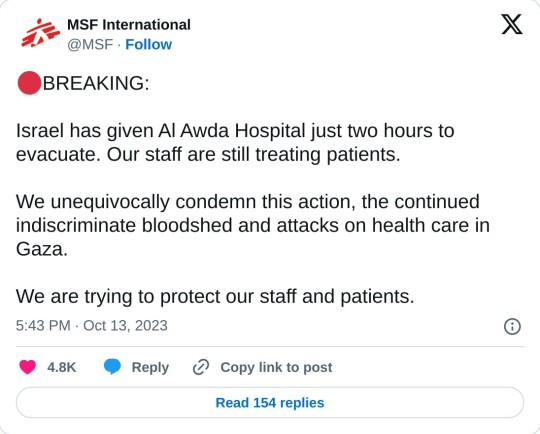
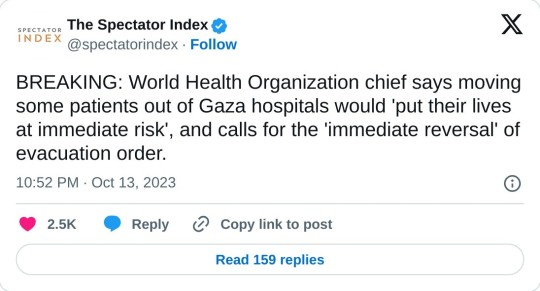
This, btw, is part of the reason they cut electricity so that Palestinians can't post their own genocide on social media. Israel brutality is costing them allies but they have no intention of stopping.
Despite all of this, there has been a great deal of support for Palestinians globally
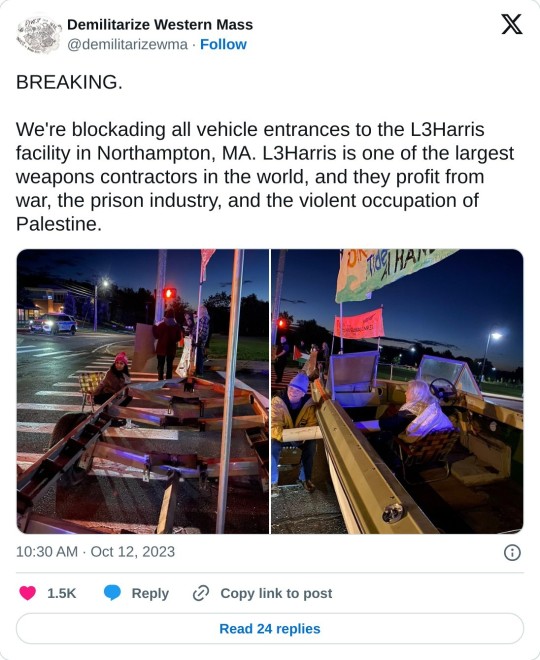
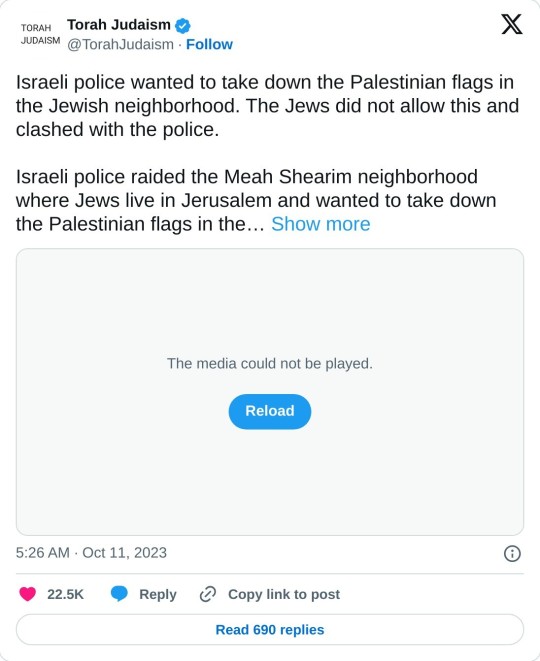

In short, this war is not going the way Israel thought it would. They didn't crush Hamas and the other Palestinian military groups immediately after the battle of Re'im. In fact, they're still struggling against those groups right now. They've been humiliated in front of the world after being revealed to be paper tigers and as such, they're going after Palestinian civilians in increasingly horrific ways.
The Palestinian resistance is still optimistic and they're still carrying out their plan. There's still hope for a future without apartheid.
1K notes
·
View notes
Text

I'm separating this out from the poll because honestly the results are neither here nor there and I want this to be its own post. It's going to be an odd one, so bare with me.
Can I take this opportunity to talk about the actual reason I think that Gwen gets a lot of hate? Coming from someone who spent a good maybe ten years somewhat in the Gwen bash camp and in the past handful of years has had some clarity over it.
The reason people don't like Gwen is that she is narratively immune from consequence. All of the Torchwood team are morally compromised and make bad choices and are made to suffer for it. Gwen, for the most part, is not. This is not a problem with the character Gwen Cooper. This is a problem with her writing. That's where the problem lies. I actually love Gwen. I hate her writing.
Looking at things like her cheating on Rhys. Firstly with James and secondly with Owen. She gets what she needs emotionally, things end, and she stays with Rhys. There are no consequences. Owen sleeps with her and then falls in love with Diane and is framed as the villain.
Torchwood becomes a priority in her life and yet she is still able to maintain enough of a social life to have close friends in her wedding party. There are no consequences. Tosh has Torchwood as her priority and finds it impossible to have a social life.
She thinks with her heart and gets people hurt. She smuggles Suzie out, she gets Rhys shot, she traumatizes Nikki. People get hurt, but it's framed as okay because she means well. There are no consequences.
She pushes against Jack and gets away with it, when Owen gets fired. She brings a third party into the Hub to keep them safe and while he gets killed, it's undone by the end of the episode, while Tosh and Ianto have their loved one die permanently. Torchwood operatives can't have spouses brought into the fold and will be stood down if pregnant, yet she brings Rhys into the fold with no consequences and her pregnancy at the beginning of COE is framed as not being a deal breaker.
I love this messy bitch. They're all messy bitches and if you have one that you single out as being worse than the others, then it's worth taking a look at that. I think that when it comes down to it, it isn't actually the character Gwen Cooper that people find problem with, but the lack of consequences that she faces.
We're a lot better as a fandom these days. The anti-Gwen sentiments have really cooled off. I also think that a lot of that cooling off has come from the newer fans having a wider view of the her character, which stemmed from the handing over of writing duties from the TV crew to the EU crew. The rose coloured glasses of the TV crew have come off and the current writers have gone "okay, her life has been ruined. Let's actually show that fall out. Let's give some consequence". And I think that did wonders for the character.
It's nearly impossible to separate an issue with narrative from an issue with character. The two things are so entwined that you almost can't extract them and that's a shame. Because the character is brilliant and was mishandled by writers who had a boner that lasted for much longer than recommended.
#torchwood#gwen cooper#long post#I hope this doesn't come off as a bash post because it's literally the opposite#I want to kiss BF on the lips for actually giving her grounded writing
18 notes
·
View notes
Note
The drug thing and diary farming
ohohoh so i'm not as seasoned in the area of crystal meth; I think Gus knows enough about that if we're talking about Gus Fring. I am more knowledgeable in the field of opioids because it's more of a problem where I live and it's a pretty old phenomenon. So not considering the United States, you can trace a lot of mass opium addiction to the appropriately-named Opium Wars that took place mainly between China and the UK. This was because the UK wanted to trade large amounts of tea from China but there were generally conflicts with that cause y'know, imperialism rightfully leaves a bitter taste in some people's mouths. So this ended in a sketchy deal where opium instead ended up being smuggled to China, getting a lot of people hooked. So began a mass addiction to opiates. Another thing that I can trace to modern opioid addiction in the US is OxyContin. This common prescription painkiller was first advertised as a "non-addictive" alternative to many painkillers. Spoiler alert - this was incorrect information and a lot of people, especially people from rural areas, got addicted real fast. This led to an uptick in heroin use as well, I believe. Looking into the cocaine/crack epidemics on another note; cocaine was used a lot by the Hollywood elite/generally rich white people leading up to the 1980s. That is, powder cocaine. When crack was introduced, it was a basic alternative to cocaine that allowed for it to be smoked/shot up meaning quicker and stronger absorption into the blood stream, if that makes sense. This was actually a lot more accessible and affordable. It made its way into the poorer regions of the United States, specifically Black communities, very very quickly because of this. This was essentially because of the US's involvement with Latin American countries that supplied the stuff - the CIA was involved with coups in that area that supported these sketchy groups opposed to democratic uprisings in Latin America. The US disliked this democracy because it meant that theses countries were getting more stable, self-sufficient and independent from countries like the United States that had power in the form of companies based there that could do essentially whatever the hell they liked. The CIA allowed for these anti-democratic groups to funnel their cocaine up into the United States and created a racial disparity. Oh boy. How surprising and uncharacteristic of the CIA (sarcasm). It goes deeper than that but I'll stop there. NOW. On a lighter note - DAIRY FARMING :)))
I am a dairy farmer right now! I milka the cows and all that good stuff. that entails a LOT but I'm going to stick to what I really focus on in the job.
-Milking cows. It's pretty robotic but I enjoy it. We use machines so I don't milk by hand unless I need to test a cow - basically what you do is you sanitize each teat with an iodine-based solution, wipe that off after a couple of seconds, and put on the machine. Once they're all done, you check to see if their udder is firm (which could indicate the presence of a disease like mastitis or that the cow isn't milked all the way) and if they're good, you put another solution on their teats (post-dip. The first solution is called pre-dip). Voila! You've milked a cow, my friend. And what you do to one, you must do to the next two hundred we have coming in.
-DISEASE. very feared amongst farmers. Sanitation is sososososo important and a huge part of the job is washing the parlor (the room where we milk), the equipment, and cleaning the housing area for the animals. These things shit. A lot. it's messy.
-Crop work. My beloved. Love of my life. Everyone loves operating machinery. tractors are cool. Hay season makes me so sentimental it's insane. Been doing that shit since I was five years old. You lug around dry grass all day in the hot sun and it's amazing beyond words.
-Finally, my coworkers. I won't talk too much about them because they're real people who probably would be uncomfortable with getting posted about on tumblr, but they're crazy. You either work with teenage boys or really old guys. I'm the sole female worker right now and it's something to witness for sure.
Sorry for the long post. Hope this answers your questions, Gus!
5 notes
·
View notes
Text
MOSSAD
Adolf Eichmann was captured in Buenos Aires, Argentina by Mossad. Wolfgang lots was a MOSSAD agent in egypt. However he was saved by the deal between mossad and the BND who claimed him as an german agent.
1962 Gamal Abdul Nasser aims to unite all Arab countries and demolish jews. Claims his missiles will reach Israel. The missile project relied heavily on German experts with nazi pasts. Heinz krug was in charge of logistics. He was practically the boss. He was abducted from Munich, Germany by MOSSAD agents posing as Egyptian businessman. He was later interrogated in Israel and killled.
Former SS man, Otto Skorzeny was offered protection by Mossad when nazis all across the world were under threat of being hunted by MOSSAD. He had direct access to the leading figures of Rocky program. He enjoyed protection of dictator Francisco Franco in Spain. He reached out to every technician and every German official in Egypt. By 1965, Nasser's Rocky program came to a halt. However, Soviets extended their support to Egypt for the missile program.
CIA didn't really favor Israel as a partner. The decisive influence on Israel Us intelligence relations was James Angleton. He had went from becoming an anti semitic to a zionist.
Mig 21 (Soviet) were supplied to Arabs. Munir Redfa was an Iraqi fighter(an Assryian Christian thus wouldn't be promoted any further). His family was smuggled & Mossad had to take out all the 32 cousins out of Iraq. The Mig 21 was first time in Western hands(Operation Diamond).The Americans were the first to assess it. During the 6 day war, Kill ratio was 5:1 owing to the Mig 21 intelligence. After the 6 day war, Israel controls 4 times the region originally designated to it by UN.
Fatah Arafat(President,Palestine) became the face of palestinian resistance.The west turned a deaf ear to palestinian terrorists on European land.Munich Olympics 1972 ,palestinians shot and killed 2 Israeli olympic atheletes and held 13 hostages.200 palestinian combatants and 2 german terrorists were demanded.The terrorists were students in Germany.The Israeli pm had refused.The Israel army was forbidden in Germany and none of the atheletes survived. The hostage takers were also released after a lufthansa jet was hijacked.
Within a year,14 palestini leaders are killed. Mossad has been helping christians in South sudan against the ruling arabs, kurds in iraq and christians in Lebanon.100 israeli citizens were taken by hijackers to Idi Amin the ugandan dictator.Isreal doesn't negotiate with terrorists.
In 1970, El sadat(President, Egypt) with military background took over and aimed to annihilate Israel. 1973, Ashraf Marwan was the son in law of nasser and advisor of new pm of Egypt. He was an informant of Mossad. Egypt and Syria attacked Israel with no warning from Marwan. However, the Arabs had done it on purpose.Israel won the war but paid in blood.
Egypt didn't want Soviet influence and thus established good ties with Israel for American relations.
The shah of Iran, Mohammad Raza had good relations with israel until the religious protests rose. Ruholla Khomeini establishes theocracy
1980 The PLO set up bases in Lebanon where the Mossad was powerless. Mossad found their allies here in the Christian groups. The Mossad invaded Lebanon. Their major objective was not to exterminate the PLO but to destroy all infrastructure that the PLO had. After 2 months, a Christian president was set up. But he was killed with a bomb and again an arab rule was set up.
Ethiopian Jews were smuggled to Sudan and from there to Israel. Israeli people posed as resort owners in Ethiopia. Sudanese dictator was paid hefty amounts and it was done confidentially to protect sudanese name in the Arab world. But there was a regime change in Sudan. As a result, 4000 jews were killed but the Mossad was able to protect 20000 jews.
A peace treaty signed between Israel and PLO(noble peace prize also awarded) but their emerged a Islamist radical organisation called the Hamas with the aim to establish a theocracy. The PLO however decided to put a delay on exterminating Hamas. Hamas had their bases set up in Amman, Jordan.
1997 The mossad failed their operation to kill Khaled Meshal. The govt led by Benjamin Netanyahu had put pressure on mossad. The agents were given orders to not attack if he wasn't alone but they still attacked and the mission failed. They were later released for the antidote that Israel provided to Khaled Meshal.
The theocracy in Iran also saw Israel as an adversary. Thus the nuclear program of Iran was the biggest threat. Scientists were killed off. Viruses were sent. This automatically led to Iran being more cautious with every equipment and every man which postponed it for 2-3 more years. The US was also given confidential information and the iran bomb was declared a threat to the world. Various sanctions were imposed on Iran.In 2015,however a nuclear treaty was signed. Mossad in 2018 however collected proofs which were presented by the PM Netanyahu himself. Thus sanctions were imposed again on Iran by Donald Trump.
3 notes
·
View notes
Text
Hitler’s Shadow Reaches toward Today
https://consortiumnews.com/2014/05/14/hitlers-shadow-reaches-toward-today-2/
From the Archive: The key role of neo-Nazis in Ukraine’s U.S.-backed coup is denied by the mainstream U.S. press, which can’t believe the U.S. government would collaborate with such unsavory characters, but that isn’t the real history, as Robert Parry reported in 2010.
By Robert Parry (Originally published on Dec. 17, 2010)
The U.S. government protected Nazi war criminal Klaus Barbie in the years after World War II and later unleashed the infamous Butcher of Lyon on South America by aiding his escape from French war-crimes prosecutors, according to a report issued by the National Archives in 2010.
The report, entitled “Hitler’s Shadow,” concentrates on the decisions by the U.S. Army’s Counterintelligence Corps to use Barbie and other ex-Nazis for early Cold War operations, but other work by investigative journalists and government investigators has shown how Barbie’s continued allegiance to Nazi ideology contributed to the spread of right-wing extremism in Latin America.

▲ Nazi SS officer Klaus Barbie.
With his skills as an intelligence operative and his expertise in state terror, Barbie helped shape the particularly vicious style of anti-communism that dominated South America for most of the Cold War. He also played a role in building a conduit for drug proceeds to fund right-wing paramilitary operations, including Ronald Reagan’s beloved Nicaraguan Contra rebels.
In 1980, Barbie used his perch in Bolivian intelligence to organize an alliance of military leaders and cocaine barons to overthrow Bolivia’s democratically elected leftist government in a bloody coup. Though fitting with Washington’s distrust of left-wing populist governments in South America, the so-called Cocaine Coup had other long-term consequences for the United States.
Bolivia’s coup regime ensured a reliable flow of coca to Colombia’s Medellin cartel, which quickly grew into a sophisticated conglomerate for smuggling cocaine into the United States. Some of those drug profits then went to finance right-wing paramilitary operations, including the CIA-backed Contras, according to other U.S. government investigations.
Barbie reportedly collaborated, too, with representatives of Rev. Sun Myung Moon’s Unification Church as they worked with Bolivia’s Cocaine Coup regime to organize anti-communist operations in South America. By then, the region had become a center for Moon’s global money-laundering operations. In 1982, Moon began pouring hundreds of millions of his mysterious dollars into the right-wing Washington Times newspaper to influence U.S. politics.
Eventually, as Bolivia’s corrupt Cocaine Coup government crumbled and Barbie’s identity became well known, French authorities finally secured Barbie’s return to France to face a war-crimes trial in 1983. (He died in 1991.)
The Butcher of Lyon’s role in these South American anti-communist activities caused brief embarrassment for Moon’s church and some right-wing Americans. But the Nazi collaboration didn’t draw much attention from the U.S. news media, which was already shying away from critical reporting on the Reagan administration’s unsavory alliances in Central and South America.
A Long Continuum
Indeed, the Right’s growing dominance of Washington opinion circles can be viewed as a continuum dating back to those days right after World War II, when U.S. priorities switched quickly from prosecuting Axis war criminals to seeking their help in crushing leftist political influence in Western Europe and Asia.
Suddenly, U.S. intelligence agencies were freeing Nazi and Japanese war criminals from prison and exploiting their talents to neutralize labor unions, student groups and other left-wing organizations.
Though the National Archives report deals with ex-Nazis in Europe, a similar program was underway in Japan where war criminals such as right-wing yakuza gangsters Yoshio Kodama and Ryoichi Sasakawa were freed and allowed to become important political figures in Japan and later internationally by supporting a global crusade against communism.
In the 1960s, Kodama and Sasakawa joined with Rev. Moon and two right-wing dictators, Taiwan’s Chiang Kai-shek and South Korea’s Park Chung Hee, to create the World Anti-Communist League (WACL), which also brought in right-wing leaders from Latin America and Europe, including ex-Nazis and neo-Nazis, according to authors Scott and Jon Lee Anderson in their landmark 1986 book, Inside the League.
So, with the Cocaine Coup in 1980, Barbie not only closed the circle, bringing together death-squad commanders, ex-Nazis, neo-Nazis and various sociopaths from around the globe, but he helped ensure that drug proceeds would be available to fund right-wing causes in the future.
“Hitler’s Shadow,” in effect, tells the first chapter of this right-wing restoration as U.S. intelligence agencies turned to former Nazi officials and SS officers to counter the perceived greater threat from the Soviet Union and Communist groups in Europe.
“Gestapo officers, who also held ranks in the SS, were in the U.S. Army Counterintelligence Corps’s automatic arrest category after the war,” the report said. “Later, CIC used former Gestapo officers to garner useful intelligence for the postwar period on everything from German right-wing movements to underground communist organizations. Intelligence officers often overlooked the significant role Gestapo officers played in the murder of Jews, POWs, and the political enemies of the Nazis.”
The report notes that “approximately 1,200 newly released files relate to the penetration of German Communist activities and specifically to ‘Project Happiness,’ the CIC’s codename for counterintelligence operations against the KPD,” the German Communist Party.
Though Barbie notorious for personally torturing French partisans during the war may be the best known ex-Gestapo officer recruited by the CIC, others had similar histories.
For instance, Anton Mahler was the chief interrogator of Hans Scholl, a leader of the White Rose, a Munich-based student organization that secretly passed out leaflets urging Adolf Hitler’s overthrow and decrying German apathy in the face of Hitler’s crimes. Hans and his sister Sophie Scholl were convicted of high treason and beheaded in February 1943.
Mahler also served in Einsatzgruppe B in occupied Belarus as the group slaughtered more than 45,000 people, most of them Jews, the report said. Nevertheless, CIC deployed Mahler as an informant starting in February 1949 and soon made him a full-time employee.
Regarding Barbie, the report builds on a 1983 investigation by a Justice Department investigator who confirmed suspicions that U.S. intelligence had worked with and protected this hunted war criminal who was accused of executing 4,000 people and shipping 7,000 Jews to concentration camps.
“In the spring of 1947 a CIC agent named Robert S. Taylor from CIC Region IV (Munich) recruited Klaus Barbie, the one-time Gestapo Chief of Lyon (194244),” the new report said. “Barbie helped run a counterintelligence net named ‘Büro Petersen’ which monitored French intelligence.
“In 1948 Barbie helped the CIC locate former Gestapo informants. In 194950, he penetrated German Communist Party (KPD) activities in CIC Region XII (Augsburg). He continued to work for the CIC in return for protection against French war crimes charges.”
Ratline to Bolivia
The story of Barbie’s escape to South America with the CIC’s collaboration was addressed in the 1983 report by Allan A. Ryan Jr., head of the Justice Department’s Nazi-hunting Office of Special Investigations. Ryan’s 218-page report said that in 1951, the CIC helped Barbie evade French authorities and flee over a “ratline” to Bolivia.
Ryan said that a half dozen CIC officers participated in the cover-up of Barbie’s identity and excused their actions by claiming that the French arrest of Barbie could jeopardize the security of other CIC operations. To get Barbie to Bolivia, the CIC officers used a ratline run by a Croatian priest, Father Krunoslav Draganovich, Ryan wrote.
Ryan said the Central Intelligence Agency later rebuffed suggestions that Barbie be reactivated in the 1960s, but Barbie using the name Altmann held an official position with a state-owned shipping company that allowed him to move freely and even to travel to the United States. [For more on Ryan’s report, see Time magainzse, Time magazine, Aug. 29, 1983]
More significantly, Barbie became a figure in Bolivian intelligence and used that perch to coordinate with other right-wing intelligence services around the continent that were engaged in Operation Condor, a program of assassinating suspected subversives and other dissidents.
In the 1970s, these intelligence agencies had teamed up to give their assassination squads regional and even global reach, including the murder of Chilean diplomat Orlando Letelier and an American co-worker on the streets of Washington in 1976.
For the Cocaine Coup in 1980, Barbie recruited Argentina’s feared intelligence service along with young neo-Nazis from Europe. The World Anti-Communist League arranged support from Moon and other Asian rightists.
For years, Moon had been sinking down roots in South America, especially in Uruguay after right-wing military dictators seized power there in 1973. Moon also cultivated close ties with dictators in Argentina, Paraguay and Chile, reportedly ingratiating himself with the juntas by helping the regimes buy weapons and by channeling money to allied right-wing organizations.
“Relationships nurtured with right-wing Latin Americans in the [World Anti-Communist] League led to acceptance of the [Unification] Church’s political and propaganda operations throughout Latin America,” the Andersons wrote in Inside the League.
“As an international money laundry, the Church tapped into the capital flight havens of Latin America. Escaping the scrutiny of American and European investigators, the Church could now funnel money into banks in Honduras, Uruguay and Brazil, where official oversight was lax or nonexistent.”
Moon expanded his network of friends when Barbie helped pull together a right-wing alliance of Bolivian military officers and drug dealers for the Cocaine Coup. WACL associates, such as Alfredo Candia, coordinated the arrival of some of the paramilitary operatives from Argentina and Europe who would help out in the violent putsch.
Barbie, then better known as Altmann, was in charge of drawing up plans for the coup and coordinating with Argentine intelligence. One of the first Argentine intelligence officers to arrive was Lt. Alfred Mario Mingolla.
“Before our departure, we received a dossier on” Barbie, Mingolla later told German investigative reporter Kai Hermann. “There it stated that he was of great use to Argentina because he played an important role in all of Latin America in the fight against communism. From the dossier, it was also clear that Altmann worked for the Americans.”
The Cocaine Motive
As the coup took shape, Bolivian Col. Luis Arce-Gomez, the cousin of cocaine kingpin Roberto Suarez, also brought onboard neo-fascist terrorists such as Italian Stefano della Chiaie who had been working with the Argentine death squads. [See Cocaine Politics by Peter Dale Scott and Jonathan Marshall]
Still a committed fascist, Barbie started a secret lodge, called Thule. During meetings, he lectured to his followers underneath swastikas by candlelight.
On June 17, 1980, in nearly public planning for the coup, six of Bolivia’s biggest traffickers met with the military conspirators to hammer out a financial deal for future protection of the cocaine trade. A La Paz businessman said the coming putsch should be called the “Cocaine Coup,” a name that would stick. [See Cocaine Politics]
Less than three weeks later, on July 6 in Buenos Aires, Argentina, U.S. undercover drug enforcement agent Michael Levine said he met with a Bolivian trafficker named Hugo Hurtado-Candia. Over drinks, Hurtado outlined plans for the “new government” in which his niece Sonia Atala, a major cocaine supplier, will “be in a very strong position.” [See Levine’s Big White Lie]
On July 17, the Cocaine Coup began, spearheaded by Barbie and his neo-fascist goon squad which was dubbed the “Fiancés of Death.”
“The masked thugs were not Bolivians; they spoke Spanish with German, French and Italian accents,” Levine wrote. “Their uniforms bore neither national identification nor any markings, although many of them wore Nazi swastika armbands and insignias.”
The slaughter was fierce. When the putschists stormed the national labor headquarters, they wounded labor leader Marcelo Quiroga, who had led the effort to indict former military dictator Hugo Banzer on drug and corruption charges. Quiroga “was dragged off to police headquarters to be the object of a game played by some of the torture experts imported from Argentina’s dreaded Mechanic School of the Navy,” Levine wrote.
“These experts applied their ‘science’ to Quiroga as a lesson to the Bolivians, who were a little backward in such matters. They kept Quiroga alive and suffering for hours. His castrated, tortured body was found days later in a place called ‘The valley of the Moon’ in southern La Paz.”
To DEA agent Levine back in Buenos Aires, it was soon clear “that the primary goal of the revolution was the protection and control of Bolivia’s cocaine industry. All major drug traffickers in prison were released, after which they joined the neo-Nazis in their rampage.
“Government buildings were invaded and trafficker files were either carried off or burned. Government employees were tortured and shot, the women tied and repeatedly raped by the paramilitaries and the freed traffickers.”
The fascists celebrated with swastikas and shouts of “Heil Hitler!” Hermann reported. Col. Arce-Gomez, a central-casting image of a bemedaled, pot-bellied Latin dictator, grabbed broad powers as Interior Minister. Gen. Luis Garcia Meza was installed as Bolivia’s new president.
The victory put into power a right-wing military dictatorship indebted to the drug lords. Bolivia became South America’s first narco-state.
Moon’s Throne
One of the first well-wishers arriving in La Paz to congratulate the new government was Moon’s top lieutenant (and former KCIA officer) Bo Hi Pak. The Moon organization published a photo of Pak meeting with the new strongman, General Garcia Meza. After the visit to the mountainous capital, Pak declared, “I have erected a throne for Father Moon in the world’s highest city.”
According to later Bolivian government and newspaper reports, a Moon representative invested about $4 million in preparations for the coup. Bolivia’s WACL representatives also played key roles, and CAUSA, one of Moon’s anti-communist organizations, listed as members nearly all the leading Bolivian coup-makers.
Soon, Colonel Luis Arce-Gomez, a coup organizer and the cousin of cocaine kingpin Roberto Suarez, went into partnership with big narco-traffickers, including Cuban-American smugglers based in Miami. Nazi war criminal Barbie and his young neo-fascist followers found new work protecting Bolivia’s major cocaine barons and transporting drugs to the Colombian border.
“The paramilitary units conceived by Barbie as a new type of SS sold themselves to the cocaine barons,” German journalist Hermann wrote. “The attraction of fast money in the cocaine trade was stronger than the idea of a national socialist revolution in Latin America.”
A month after the Cocaine Coup, General Garcia Meza participated in the Fourth Congress of the Latin American Anti-Communist Confederation, an arm of the World Anti-Communist League. Also attending that Fourth Congress was WACL president Woo Jae Sung, a leading Moon disciple.
As the drug lords consolidated their power in Bolivia, the Moon organization expanded its presence, too. Hermann reported that in early 1981, war criminal Barbie and Moon leader Thomas Ward were seen together in apparent prayer.
On May 31, 1981, Moon representatives sponsored a CAUSA reception at the Sheraton Hotel’s Hall of Freedom in La Paz. Moon’s lieutenant Bo Hi Pak and Bolivian strongman Garcia Meza led a prayer for President Ronald Reagan’s recovery from an assassination attempt.
In his speech, Bo Hi Pak declared, “God had chosen the Bolivian people in the heart of South America as the ones to conquer communism.”
Flush with Cash
In the early 1980s, cocaine kingpin Suarez his coffers now overflowing with cash invested more than $30 million in various right-wing paramilitary operations, including the Contra forces in Central America, according to U.S. Senate testimony in 1987 by an Argentine intelligence officer, Leonardo Sanchez-Reisse.
Sanchez-Reisse testified that the Suarez drug money was laundered through front companies in Miami before going to Central America. There, Argentine intelligence officers, including Sanchez-Reisse and other veterans of the Cocaine Coup, trained the fledgling Contra forces.
But by late 1981, the cocaine taint of Bolivia’s military junta was so deep and the corruption so pervasive that U.S.-Bolivian relations were stretched to the breaking point. “The Moon sect disappeared overnight from Bolivia as clandestinely as they had arrived,” Hermann reported.
The Cocaine Coup leaders soon found themselves on the run, too. Interior Minister Arce-Gomez was extradited to Miami and was sentenced to 30 years in prison for drug trafficking. Drug lord Suarez got a 15-year prison term. General Garcia Meza became a fugitive from a 30-year sentence imposed on him in Bolivia for abuse of power, corruption and murder.
SS veteran Barbie was returned to France to face a life sentence for war crimes. He died in 1991 at the age of 77.
But Moon’s organization suffered few negative repercussions from its role in the Cocaine Coup. By the early 1980s, flush with seemingly unlimited funds, Moon had moved on to promoting himself as a key friend of the new Republican administration in Washington.
A guest at Reagan’s First Inauguration, Moon made his organization useful to the new President and to Vice President George H.W. Bush, who would later become a paid speaker for Moon’s organization. Where Moon got his cash was not a mystery that American conservatives were eager to solve.
“Some Moonie-watchers even believe that some of the business enterprises are actually covers for drug trafficking,” wrote Scott and Jon Lee Anderson.
While Moon’s representatives have refused to detail how they’ve sustained their far-flung activities including many businesses that insiders say lose money Moon’s spokesmen have denied recurring allegations about profiteering off illegal trafficking in weapons and drugs.
In a typical response to a gun-running question by the Argentine newspaper, Clarin, Moon’s representative Ricardo DeSena responded, “I deny categorically these accusations and also the barbarities that are said about drugs and brainwashing.” [Clarin, July 7, 1996]
Nevertheless, Moon’s organization did its best to disrupt the work of U.S. investigative reporters and government investigators looking into the connections between the drug trade and right-wing paramilitary operations such as the Nicaraguan Contras.
In the mid-1980s, for instance, when journalists and congressional investigators began probing the evidence of Contra-connected drug trafficking, they came under attack from Moon’s Washington Times. An Associated Press story that I co-wrote with Brian Barger about a Miami-based federal probe into gun- and drug-running by the Contras was disparaged in an April 11, 1986, front-page Washington Times article with the headline: “Story on [contra] drug smuggling denounced as political ploy.”
When Sen. John Kerry, D-Massachusetts, uncovered additional evidence of Contra-drug trafficking, the Washington Times denounced him, too. The newspaper published articles depicting Kerry’s probe as a wasteful political witch hunt. “Kerry’s anti-contra efforts extensive, expensive, in vain,” declared the headline of one Times article on Aug. 13, 1986.
Despite the attacks, Kerry’s Contra-drug investigation eventually concluded that a number of Contra units were implicated in the cocaine trade.
“It is clear that individuals who provided support for the contras were involved in drug trafficking, the supply network of the contras was used by drug trafficking organizations, and elements of the contras themselves knowingly received financial and material assistance from drug traffickers,” Kerry’s investigation stated in a report issued April 13, 1989.
Mysterious Contra Backer
In 1998, CIA’s Inspector General Frederick Hitz confirmed the earlier allegations of extensive cocaine trafficking by the Contras, including significant ties to Bolivia’s traffickers. Hitz also cited a partially redacted document referring to a “religious” group cooperating with the Contra-cocaine trade.
“There are indications of links between [a U.S. religious organization] and two Nicaraguan counter-revolutionary groups,” read an Oct. 22, 1982, cable from the office of the CIA’s Directorate of Operations. “These links involve an exchange in [the United States] of narcotics for arms.”
In 1982, the CIA quickly shut down any further reporting on this drug deal, citing the role of U.S. citizens. “In light of the apparent participation of U.S. persons throughout, agree you should not pursue the matter further,” CIA headquarters wrote on Nov. 3, 1982.
During the Inspector General’s investigation, Hitz conducted a follow-up interview, with Contra-connected drug trafficker Renato Pena, who described the redacted U.S. religious organization as a Contra “political ally that provided only humanitarian aid to Nicaraguan refugees and logistical support for contra-related rallies, such as printing services and portable stages.”
Moon’s religious-political groups, some based in the United States, were extremely active supporting the Contras in the early 1980s, suggesting that Moon’s Washington Times might have had more than an ideological reason to attack investigators exploring Contra drug trafficking.
To this day, the Washington Times remains a reliably right-wing voice in the U.S. capital. [Moon died on Sept. 3, 2012.]
Still, the CIA’s shielding of the name of that “religious organization” and similar protective behavior represented a continuation of a long-standing pattern in which U.S. intelligence covered up for right-wing and neo-Nazi criminality, a dark history that began with the likes of Klaus Barbie and has extended “Hitler’s Shadow” to modern times.
Investigative reporter Robert Parry broke many of the Iran-Contra stories for The Associated Press and Newsweek in the 1980s. You can buy his new book, America’s Stolen Narrative, either in print here or as an e-book (from Amazon and barnesandnoble.com). For a limited time, you also can order Robert Parry’s trilogy on the Bush Family and its connections to various right-wing operatives for only $34. The trilogy includes America’s Stolen Narrative. For details on this offer, click here.
#robert parry#fascism#hitler#nazism#nazis#adolf hitler#politics#consortium news#klaus barbie#contras#unification church#drug trade#drug trafficking#washington times#cia#anti-communism#unification church in latin america#unification church in south america#moonies#lfred Mario Mingolla#WACL#world anti-communist league
4 notes
·
View notes
Video
youtube
A fantastic offer to Egypt of $10 billion to receive refugees from the people of Gaza in Sinai, and America supports Israel until the end.
New Al-Aqsa Flood currency presented in this episode of Samri Channel.
Starting with a report published by Bloomberg, which said that the European Union is accelerating its efforts to deepen its relations with Egypt and help it deal with the worsening repercussions of the conflict between Israel and Hamas on its borders.
People familiar with the matter reported that European Commission President Ursula von der Leyen is planning to visit Cairo soon in order to advance efforts to support economic development in Egypt and mitigate the impact of the ongoing crisis.
The European Union was already exploring a partnership in this framework, but is currently seeking to accelerate this step given the strategic importance of Cairo, and concerns about increasing refugee flows, including from African countries such as Sudan. EU member states, including Germany and France, support the ongoing effort in this direction, although the timetable and final figures on it are still being prepared, said the insiders, who requested anonymity for the privacy of the discussions.
The plan will include 6 priorities covering the areas of economy, investments, migration, and security. On the economic level, the European Union seeks to explore options with member states in order to help Egypt address its heavy debt burden.
In addition, the Union is set to propose an investment plan aimed at pumping 9 billion euros ($9.8 billion) into sectors such as digital initiatives, energy, agriculture and transportation, interspersed with an investment forum scheduled to be held next spring. The plan also aims to reduce illegal immigration to Europe by assisting Egypt with border management, anti-smuggling measures, and voluntary returns.
The European Commission declined to comment on the matter. After signing a partnership with Tunisia to stop the arrival of migrants and support its economic development, the Commission worked to conclude a broader agreement with Egypt during the past months, given its importance as the most populous Arab country and the largest economy in North Africa. The financially strapped Egyptian economy is facing its worst economic crisis in decades, with debts falling to sub-investment levels, a delay in the date for reviewing the International Monetary Fund program, and a severe shortage of foreign exchange.
Egypt has devalued its currency three times since early 2022, with inflation rising and the pound losing nearly half its value. But von der Leyen may face some thorny conversations about Israeli military operations in Gaza, especially after she was criticized over her trip to Israel last month for not speaking decisively about the need to protect Palestinians.
The Chairperson of the Commission held talks with Egyptian President Sisi
And from Bloomberg to the Hebrew Maariv, which published a lengthy report by Israeli writer Michael Harari under the title: “Worrying cracks in the relationship with Cairo,” in which he said that Tel Aviv must pay attention to its relations with Egypt after the war, and Israel must think very seriously about the consequences of the war. On its relations with Egypt. The Israeli analyst pointed out that October 7 surprised a long series of countries, one of which is Egypt, which considers that the developments of the conflict in the Gaza Strip have direct consequences for it, stressing that unlike previous rounds of conflict in the Gaza Strip, when Egypt was able to put an end to the round of violence. Continuing, things look different this time.
The Hebrew report explained that there are three main factors behind the deep anxiety in Egypt: The first relates to the strength of the Israeli response, which resulted in the largest number of civilian casualties in the Gaza Strip and a large amount of destruction, perhaps unprecedented, and this relates primarily to the Egyptian street. And fear of internal pressures that have already begun to boil, at a time when presidential elections are expected to be held in Egypt next month. He continued: “The second relates to the fear, which we are not able to express publicly, of course, that Hamas will emerge from the war with great achievements, in a way that strengthens political Islam in the region in general, and in Egypt in particular (even though the Egyptian regime has weakened the Muslim Brotherhood significantly.” Large in recent years), and although there is a certain contradiction between the first and second factors, this tension only leads to the intensification of the strait in which Cairo is located.
He continued: “Thirdly, there is a new development. Reports related to Israel’s interest in immigration from the Gaza Strip to Sinai, including what resembles a (comprehensive deal) according to which Egypt’s burdensome financial obligations are erased in exchange for Egypt’s agreement to receive refugees, but in Cairo, this is being interpreted.” Although it is a solution to the Palestinian problem in Gaza at the expense of Egypt, the Israeli statements, including the Ministry of Intelligence report which stated that the migration of Palestinians from the Gaza Strip to Egypt serves Israel’s long-term interest, has put Cairo in real turmoil, and President Sisi has stated firmly that Egypt It will not allow this, and that if the Egyptian people call for protecting the national interest, “millions will do so.”
#Egypt
#Palestine
#Gaza
0 notes
Text
My Private History Since Highschool (Hopkinton Highschool, Honors Society):
Secret Intelligence Service (Koran Province): Legacy spies descended from famous female drafts, activated based on a type of casino wager invented to describe them. "Koran Province", is New England's metropolitan intelligence division, the Carnegie Institute; Viper-2, "Vengeance-2". Collegiate operations.
Human Intelligence (Reserve Officer Training Corps): The National Security Agency specializes in internet, home, phone, satellite, wireless, school, and city hall log privacy, with a no tolerance policy towards a "breach of access", an intrusion on anyone in United States borders. The HUMINT division specializes at courier, smuggling, and filmography warfare, with staged setups to steal and thief records through FBI warrants and laws, with ground assets from federal districts and state police assisting OP-INT, the armed division; Cyber Command, the National Guard, can be summoned to deal with rogue police and military elements.
Archdiocese of Boston (Persel): The greater archbishop's office of Massachusetts and the lesser Dioceses of New England. Persel deals with survivors of Rabbinicals, that have successfully induced a fatality in the Rabbi having "muzzled", "snuggled", or "snogged"; charged with gang warfare activities, enforcing rules for crime, misdemeanor, and vice.
Vatican (Benedictine): The Vatican is the head of the international city unions, architecture schools, dominatrix trades, police unions, and precinct commissions. Benedictine induced pre-Holocaust Polish accounting, wherein individual accounts within a family were not privvy to other family members, hence travel would be punished, as well as luxury brands; not food, family, and film, the cornerstones of the good life. Hence, a family could not extort members, at any age.
Gestapo (UMass-Amherst): African oriented, the Gestapo acts secretly on behalf of Jews, out of love for a woman stolen by an anti-Semite, a police bailiff or corrections officer. The UMass-Amherst division, Philip J. Morris, works with HUMINT and the CIA, couriers and accounts, to assassinate dictators, with a simple drinking game, taught freshman year, by "Take Back The Night", their organization. The slain, die as paragons of their community, regarded as Israeli for the rest of time; the companies involved, are folded into the Palestinian tobacco crop, out of Dutch Country; Marlboro Reds.
Yorks (COBRA): The basis of American, Israeli, and Belgian logic, the Yorks specialize in children's festivities as the route to power. COBRA, is the special division for Redcoat families, placed in a literary trap, to serve a single function during a military engagement, over and over, until married to bride, not husband; forbidden, by Herod's logic, the origin of the House of York.
People's Republic of Communist China (Scarecrow): The PRCC, represents business logic, of guarantee; unless committing criminal act, work of support, the housing of Mandarin linguistic passed abroad, for charity. Charity, is for the purpose of happiness, the only purpose any human should have. The Scarecrow, is a reference to the Wizard of Oz, someone who never needed school or college; but they're there, anyways.
Irish Mafia (Sony): Not the "Mob", a crime syndicate, the printer's union, Congress, or the IRA (buckwheats), the Jews. The Irish Mafia, in America, assists during a draft or conscription, jumping on the ship, to sabotage the project so the profiteer, dies very poorly. Sony Pictures, uses MUSH, an NSA program, to print for criminals to have a "lighter sentence" (cybersex).
0 notes
Text
Security and Legal Challenges in Belgium's Maritime Domain
Security and Legal Challenges in Belgium's Maritime Domain ===
Belgium's maritime domain plays a critical role in its economy, with its ports serving as vital gateways for international trade. However, this strategic position also brings with it a set of security and legal challenges that demand attention. This article will explore the various aspects of security and legal challenges faced in Belgium's maritime domain, addressing vulnerabilities, legal frameworks, combating illegal activities, strengthening maritime security, and providing an outlook for the future.
=== Assessing the Threat Landscape: Vulnerabilities and Risks ===
To effectively address security challenges in Belgium's maritime domain, it is essential to assess the threat landscape. The vulnerability of ports and coastal areas to illicit activities such as drug smuggling, human trafficking, and piracy poses significant risks. The vast expanse of the maritime domain, limited surveillance capabilities, and difficulties in controlling international waters further exacerbate these vulnerabilities. The presence of organized criminal networks and terrorist groups also adds to the complexity of the threat landscape.
=== Legal Framework: Maritime Laws and International Obligations ===
A comprehensive legal framework is crucial for addressing security challenges in Belgium's maritime domain. Belgium is a party to various international conventions and agreements that govern maritime activities, including the United Nations Convention on the Law of the Sea (UNCLOS). Additionally, domestic legislation, such as the Belgian Maritime Safety Act and the Belgian Anti-Piracy Law, provides a legal basis to combat illegal activities at sea. Adherence to these laws and international obligations strengthens Belgium's position in dealing with maritime security challenges.
=== Combating Illegal Activities: Smuggling, Piracy, and Trafficking ===
Smuggling, piracy, and trafficking are significant illegal activities that pose security threats in Belgium's maritime domain. Drug smuggling, particularly the transportation of cocaine, is a pressing concern. Belgium has been actively cooperating with international partners like the European Maritime Safety Agency (EMSA) and Europol to combat drug trafficking through intelligence sharing, joint operations, and the use of advanced technology such as drones and satellite surveillance. Additionally, efforts have been made to combat piracy and human trafficking by strengthening maritime law enforcement and enhancing border control measures.
=== Strengthening Maritime Security: Collaboration and Technology ===
Collaboration among various stakeholders is crucial for strengthening maritime security in Belgium. Close cooperation between law enforcement agencies, navy, coast guard, and port authorities is essential to ensure effective coordination in responding to security threats. Integration and sharing of information through platforms like the Common Information Sharing Environment (CISE) enable real-time situational awareness and facilitate timely response. The deployment of advanced surveillance technology, such as radar systems, Automatic Identification System (AIS), and unmanned aerial vehicles (UAVs), enhances the detection and monitoring capabilities, further bolstering maritime security.
=== Future Outlook: Addressing Emerging Challenges in Belgium's Waters ===
Looking ahead, Belgium must be prepared to address emerging challenges in its maritime domain. Climate change and its impact on rising sea levels and extreme weather events could pose significant security risks. Furthermore, the advent of new technologies, such as autonomous ships and unmanned underwater vehicles, may introduce new vulnerabilities and necessitate updated regulatory frameworks. Strengthening international cooperation through initiatives like the European Union's Maritime Security Strategy will be vital in combating evolving threats and ensuring the long-term security of Belgium's waters.
===
Security and legal challenges in Belgium's maritime domain require a multifaceted approach that addresses vulnerabilities, strengthens legal frameworks, combats illegal activities, and embraces collaboration and technology. By understanding the threat landscape and implementing effective measures, Belgium can enhance its maritime security and protect its economic interests. With a proactive and adaptive approach, Belgium can successfully navigate the emerging challenges in its waters, ensuring a safe and secure maritime domain for years to come.
Read the full article
#andTrafficking#AssessingtheThreatLandscape:VulnerabilitiesandRisks#Belgium#CombatingIllegalActivities:Smuggling#FutureOutlook:AddressingEmergingChallengesinBelgium'sWaters#LegalFramework:MaritimeLawsandInternationalObligations#Piracy#SecurityandLegalChallengesinBelgium'sMaritimeDomain#StrengtheningMaritimeSecurity:CollaborationandTechnology
0 notes
Text
A License Limbo
By Emma Babashak, Columbia University, Class of 2024
August 9, 2023
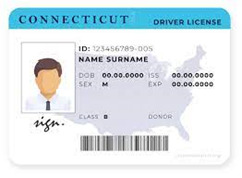
19 states and the District of Columbia currently have created laws to allow unauthorized immigrants to obtain a driver’s license in the United States. Because of this legislation, residents in these jurisdictions can obtain “drive-only” licenses without having to provide proof of lawful presence.[1]
For example, Connecticut started the drive-only license program in 2014. Currently, there are 61,000 people on Connecticut roads using “drive-only” licenses. In the first few months after the start of the program, almost 40,000 people registered to take the Department of Motor Vehicles (DMV) written driver’s test. In Connecticut, potential applicants are first required to obtain a learner’s permit. In addition, applicants must provide a valid foreign passport or proof of residency and consular identification.[2]
However, a new immigration bill in Florida may prevent drivers from driving in that state. Under SB 1718, out-of-state driver’s licenses for immigrants without permanent legal status in the United States will not be accepted by the Florida Department of Highway Safety and Motor Vehicles. Now, “drive-only” licenses are classified as "Not for Federal Identification" on the Florida Department of Highway Safety and Motor Vehicles website. The immigration bill also makes using E-Verify, a United States Department of Homeland Security website that lets a business determine the eligibility of its employees, mandatory for any employer with 25 or more employees. In addition, the bill enforces penalties for those employing illegal immigrants, increases penalties for human smuggling, forbids local governments from issuing Identification Cards (ID) to illegal immigrants and requires hospitals to collect and submit data on the costs of providing illegal immigrants health care.[3]
Governor Ron DeSantis stated, “The Biden Border Crisis has wreaked havoc across the United States and has put Americans in danger. In Florida, we will not stand idly by while the federal government abandons its lawful duties to protect our country. The legislation I signed today gives Florida the most ambitious anti-illegal immigration laws in the country, fighting back against reckless federal government policies and ensuring the Florida taxpayers are not footing the bill for illegal immigration.”
In addition, Senator Blaise Ingoglia said that, “Our Southern Border has been dealing with a manmade crisis under the ineptness of President Biden, allowing more than 6.3 million illegal immigrants to flood our border. Today, under the leadership of Governor Ron DeSantis, Florida made history signing into law the strongest state-led anti-illegal immigration bill ever brought forth. It was an honor to usher this bill through the process, knowing we are safeguarding Floridians and serving as the model for the nation to combat this crisis created by our very own President”.[3]
As a result of this immigration bill, a law enforcement officer who stops a driver with a “drive-only” license will issue that driver a citation for a misdemeanor. This fine will not exceed $500 for a misdemeanor of the second degree or a noncriminal violation. This fine will not exceed $1000 for a misdemeanor of the first degree.[2] All in all, this SB 1718 will have an impact on drivers throughout the country as more “drive-only” licenses are obtained.
______________________________________________________________
Emma Babashak is currently a rising senior attending Columbia University. She is majoring in Operations Research - Engineering Management Systems and minoring in both Economics and Psychology.
______________________________________________________________
[1] https://www.ncsl.org/immigration/states-offering-drivers-licenses-to-immigrants#:~:text=These%20states—California%2C%20Colorado%2C,as%20a%20foreign%20birth%20certificate%2C
[2] https://www.ctinsider.com/news/article/florida-ban-drivers-licenses-immigrants-ct-18195071.php
[3] https://www.flgov.com/2023/05/10/governor-ron-desantis-signs-strongest-anti-illegal-immigration-legislation-in-the-country-to-combat-bidens-border-crisis/
0 notes
Text
THE THIRD PERSON AS AN ALTERNATIVE THEORY
Raymond Reddington is born in 1960. Around 1977 he enters the Naval Academy and graduates in 1981-82. He joined the Naval Counter Intelligence and operated against the KGB. He is married in 1983 to Carla, also serving in the Navy, and in 1984 they have a daughter, Jennifer.Sometime in 1984 he is captured by a Russian agent code named Sea Duke, interrogated under torture and after 10 days he is rescued by a Pentagon-FBI joint operation.In 1956 an air force pilot Eugene Taylor Phillips, gives birth to a son, Julian Ralston Phillips (names don’t really matter). His mother, Elizaveta, is a White Russian, possibly of noble descent that escaped Russia after the fall of the Romanovs, and anti-communist.He grows up to be a rebellious and difficult child, changing homes often due to his father’s work. His father plans to send him to a military school after the family tradition but he does not want, gets into all kinds of trouble and he is arrested for petty theft. His father excommunicates him and finally he runs away when he is 17 years of age. In this scenario, Ilya and Ivan were not his childhood friends. They were Katarina’s friends.In 1984, Reddington was based in Naples, Italy, working in the NATO base. He was KGB’s most fearful enemy, so Sea Duke (Ivan Stepanov) decided to find another way to approach him since he failed the first time when he used force, so he sends a beautiful woman to seduce him. Her name is Katarina Rostova, married to a wealthy Russian Constantine Rostov, who lives in Canada. She is an American of Russian descent, who grew up in the States and she met Constantine in the White Russian circles. Reddington falls in love with her, and they have an affair. Katarina gets pregnant by Reddington, and in 1985 gives birth to a daughter, Masha. She tells Constantine that Masha is his child. Raymond does not know about Masha, but Katarina at some point tells him about their daughter.Reddington did not know that Katarina was the daughter of a Soviet Illegal spy (Russian name unknown) who have moved in the US in the 70s, living as a law abiding American, under the identity of Dominic Wilkinson. Eventually Dominic was transferred back to Moscow, and he became responsible for Illegals in the Western hemisphere. Katarina Wilkinson grew up in the States as an illegal that worked for KGB, used her marriage to Constantine as a cover, she was a travel agent, and that gave her the excuse to travel around the globe. She did not like communism she started working for Fitch and the Cabal, to bring down the Soviet Union. Tatiana Petrova in this scenario could have been Katarina’s Cyranoid, since they looked similar.Reddington abducts Masha from their home in Canada and takes her back to the States. Katarina soon follows along with Kate the nanny, leaving Constantine behind.Back in 1973, a young Julian lives in the streets with a gang of street kids who are thieves, organizing robberies to survive. Τhey try to rob the house of a wealthy American who happens to be Allan Fitch. The other kids escape but Allan captures Julian. Impressed by the boy’s talents and character offers him a deal. He will not hand him to the police, as long as he works for him. He also gives him a new identity (David Kennedy), reportedly he was abandoned as a baby in an orphanage, parents unknown. Fitch pays for his education and David joins the FBI. Fitch wants him to be his eyes and ears there, with a long term project to crack down criminal organizations that work against the US and later we find out the Cabal interests. He succeeds and in 1978 works as a junior agent. He meets Melissa, a kindergarten teacher, and they marry the same year. In 1979 they have a daughter named Elizabeth. In 1987 he works briefly with Sebastian Royce in one case. David is undercover and he helps bust an organization smuggling diamonds and as a result the organization is exposed, they lose millions of dollars. In March 22, 1987 David watches his daughter Liz dancing ballet for the last time. David asks the FBI to protect his family until all the organization’s criminals are put behind bars, but a few weeks later the organization murders his wife and daughter. In this scenario the Takhoma park house is his residence, not Reddington’s. H vows to avenge them. He quits the FBI and he contemplates suicide. Fitch asks him to work directly for him and the cabal. His mission is to create criminal organizations outside the law enforcement radar to advance the cabal’s interests. He is also authorized to eliminate criminals that oppose the cabal and threaten its interests worldwide. Fitch helps find the killers and David takes his revenge. This is the first time he tastes blood.During this period he meets and cooperates with Katarina Rostova, who is working for the cabal as a double agent. He becomes fond of Masha because she reminds him of his daughter and they become quite close. David also brings in Sam, one of the children he met when run away, who had become a successful con man. This line of work is perfect for him since when he was young he dreamed the life of outlaws.After the infamous fire Reddington dies and the fulcrum is lost. David was there with Katarina, and got his face burned while trying to find the fulcrum. David, who knew Reddington and his family through Katarina, stages Reddington’s disappearance until to decide what to do. In 1991 Katarina is hiding trying to figure out what to do but she is desperate, and David devices a plan to create a fake death. The 90s is the age that DNA identification slowly is used by the FBI. He has come across a criminal scientist who can transform someone’s DNA like that of a dead person and when examined to falsely show that is another person, similar to the alchemist’s MO. Those after Katarina bite the bait for a while and think she is dead. Unfortunately for Katarina, her enemies were able to discover the fake DNA and increase their efforts to locate her. They know that it was David who organized the ruse and he becomes a target as well. He has facial surgery since his face was badly burned and decides to take Reddington’s face since had a similar appearance, to get Reddington’s millions from the banks, and he does the same to Katarina to alter her face. People would believe he is Reddington, because after the fire he was badly burned and allegedly he had a plastic surgery to fix his face.Then he reinvents himself as Reddington, uses the fulcrum as a leverage against them and creates his criminal organization to keep him and Elizabeth safe from the cabal and Hydra until he can destroy them, his 30 year old project that gives purpose to his life. There is one thing to do to make sure nobody will find out his true identity. He and Katarina decide to bury Reddington’s body in Tansi farm so the world never learns that he died.There is one problem, if they ever discover the new Katarina she might be forced to reveal where Masha is. It’s a Hobson choice, to save Masha or Katarina. David takes Katarina and against her will erases her memory and gives her a new identity, that of Kassandra Bianchi. She is oblivious of her former self, and she will not recognize her daughter if they ever meet. This is what Dembe meant when he said that Elizabeth would never be ready to learn what you did to Katarina. They also alter Masha’s memory to forget her past and shooting her father. He now feels responsible for Masha who he sees as a replacement of his daughter, gives her to Sam. She now knows her name is Elizabeth, with no memory that once she was called Masha. He is obsessed with her and he sees her as a second opportunity to save her when he failed to save his own daughter. Although Reddington is dead he does not want his family to suffer the same fate as his and arranges to hide Carla and Jennifer in WITSEC.That is why when Kirk asked him if Masha was his daughter he refused to answer, but he replied that Elizabeth was his daughter.Only Fitch knew his real identity to the rest of the cabal and the world he was Reddington. That’s why Diana Fowler asked Red if he wanted to know what happened to his family, she meant to find out about Carla and Jennifer.Of course, this story is not perfect and maybe some readers would fins plot holes and mistakes, but it tries to follow the mythology as much as possible, with a more complex story than that of Redarina. His love to Liz is dark not parental exactly, and he has a purpose a 30 year old project, instead of doing all these just to save a child’s life but in the process drives her insane and kills her just because she was ashamed to tell her the truth. Where was the meaning of these after all?Όλες οι αντιδράσεις:11115 σχόλιαΜου αρέσει!ΣχόλιοΑποστολή
1 note
·
View note
Text

⸻ "To live, and thrive; for we also are a part of this world." ⸻
⸻ Like a flower in the desert
We shall bloom despite everything thrown our way, for we also have a right to live and prosper under the sun of Thavnair. Some would push us into the shadows to forget our existence, but we’ve adapted and now we thrive; they’re not the only ones who know how to make a profit in this land.
⸻ What we’re looking for
Thieves, con artists, smugglers, information brokers, spies, mercenaries, suppliers, medics, alchemists… This is far from an exhaustive list and if you believe your skills or your business could be of interest to us, by all means, tell us more. Or are you instead looking for our services? Nobles, merchants, adventurers, civilians; come, have a seat, and let us discuss.
⸻ In a nutshell
Jijivisha is a RP Cross-world Linkshell community on the Crystal Datacenter. We operate primarily in Northern American timezones and focus on criminal, morally gray and character driven RP, set in THAVNAIR and the Near-East. Think of it as a "Robin Hood" archetype organization - a mix of vigilantism, social banditry and anti-hero.
Communication is done via an in-game CWLS (members and associates) and a Discord server (public). Jijivisha also has a Free Company on Balmung but joining is not mandatory.
⸻ Need a thorn in your side?
We’d love to collaborate if you need an antagonist, as individuals (Fakhri alone can be a pain in the ass) or as an organization. We’re not evil, but we certainly don’t play by the book, and Jijivisha’s dealings could become a hindrance for some; or merely an entity to watch closely. Or maybe we’re after you… the tables can turn after all. Keep in mind we’re more into white collar crime, con artistry, theft, forgery, smuggling, gambling and general intrigue than anything else. WE won’t send assassins after you, do refrain from sending any after us ;)
⸻ CARRD | https://jijivisha.carrd.co
⸻ DISCORD | https://discord.gg/WxqeHx6SqY
79 notes
·
View notes
Text
This will be a tough read as it mentions the sexual assault of minors.
Emily’s* experience of child exploitation began when she was 11 and a middle-aged neighbour started cajoling her into smuggling packs of drugs around towns in northern England and Wales.
Every drug run was a carefully orchestrated act of deception. Emily would be driven from house to house in the neighbour’s car. To anyone who saw them, they looked like a young girl out with her father. Police officers on patrol were unlikely to suspect that tucked under her blouse were plastic bags filled with cocaine, heroin and weed.
To Emily, who lived on an estate on the derelict fringes of a Welsh seaside town, where drug trafficking was rife and girls as young as eight were roped in to deliver drugs in their toy prams, it felt exhilarating – like going on an adventure with an adult conspirator. Violence was common. On one of her drug runs, Emily witnessed one man attack another with an axe.
The neighbour handled all the cash, but would give her a bit of money to buy cigarettes or snacks. These small gifts felt like rewards.
As she grew older and began experimenting with drugs herself, he demanded sexual favours in exchange for a steady supply of pills.
Bullied at school, Emily began to see her neighbour as her only friend. “When I was with him, I felt important, like I was really doing something,” she says over the phone.
By 14, Emily was constantly playing truant, dealing drugs herself, and had been expelled from school once for fighting. “I just didn’t care about anything anymore,” she recalls ruefully.
That was the year she was gang-raped by three men. When they had finished raping her, she says they dropped her off by the side of a road like she was “a piece of rubbish”.
“There were no thoughts in my head. I was just bloodied, battered, and in indescribable pain,” Emily explains.
From then, she careened into substance abuse and depression. “I felt like there was nothing for me, and even though I was in drug and alcohol support, I’d never follow through. It felt like I shouldn’t bother,” she remembers.
She never told her parents about the drug trafficking or the sexual assault, and they assumed that she was just going through an especially stormy phase of teenage rebellion. “My mum and dad are absolutely normal, they don’t drink, smoke or take drugs,” she says. “There’s a naivete about them, they’re completely strait-laced and didn’t know what was going on. But my mum did try. She knew how important education was, and she kept trying to make me go back to school.”
But Emily’s drug addiction made her vulnerable to those who didn’t have her best interests at heart. Some of the girls at her school knew about her desperate need for money to buy drugs, so would introduce her to numerous older men who would sexually exploit her in exchange for money.
These men would also traffic her to others. Emily estimates that over the course of her teenage years, she was raped approximately 1,560 times, in run-down rooms, at the back of pubs, and wherever the men lived. She was never physically held captive, but was psychologically enslaved by her abusers, who profited off her vulnerability and kept her under control.
Only after getting pregnant with her daughter in her early 20s did she go clean and sever all contact with her traffickers. “There was a moment when I was offered drugs and I knew I couldn’t take them. I left just like that – when you’re responsible for someone else’s life, you just find that strength and you don’t engage. It was lonely, but it was worth it,” she tells me.
Today, she runs a pseudonymous account on Twitter as an anti-trafficking advocate. Her posts raise awareness of organisations and individuals working in the sector, and express solidarity with other victims and survivors.
In 2018, more than ten years after extricating herself from a string of traffickers operating across different parts of northern England and Wales, she summoned the courage to lodge a police report about the sexual exploitation she had suffered years ago. “I felt like it was something I needed to do, to face my past and look forward to the future, so the same thing wouldn’t happen to other girls and children,” she says.
When she didn’t hear back from the police, she contacted the Modern Slavery Helpline, which provides information and guidance on slavery, exploitation and abuse. It was only six months later that the police recorded her in the National Referral Mechanism (NRM), a framework created by the UK government to identify potential victims of modern slavery and ensure they receive the right support.
Alienating the most vulnerable
Drawing on international law, the UK defines human trafficking as the recruitment, movement and receipt of people by “use of force or other forms of coercion… of deception, or of abuse of a position of vulnerability”. The UK’s Modern Slavery Act, which was passed in 2015, recognises that trafficking can take on various forms such as forced labour or servitude, often into criminal activity like drug smuggling, sexual exploitation in the vein of Emily’s experience, or the removal of organs. Given that the technical definitions of “slavery” and “trafficking” intersect, both terms are often used interchangeably.
While criminal and labour exploitation tend to be the most common types of modern slavery in the UK, it is sexual exploitation that disproportionately affects women and girls. Of the 1,115 adults referred to the NRM in 2020 as being sexual exploited, an overwhelming 85 percent (940) were female.
Now, the pandemic and its accompanying lockdowns have made sex trafficking even harder to detect as potential victims, who were already isolated, find it near impossible to seek help, while the rise in online sex trafficking means web accounts can be quickly shut down and re-opened in a matter of clicks.
Amidst these alarming developments, cases of forced prostitution climbed by a quarter in 2020 as compared with 2019. According to Unseen, an anti-slavery charity, as many as 100,000 people could currently be victims of trafficking in the UK.
In the UK, individuals such as Emily, who are recognised as a victim of slavery through the NRM, were previously given access to a host of specialist services for a minimum of 45 days. This included legal aid, protection, compensation and counselling. But for many years, anti-trafficking groups and legal experts have been arguing vociferously that 45 days of specialist support was too little.
In September 2019, in response to the argument that the recovery process is not short, linear or straightforward, the Home Office created a new system of care known as the Recovery Needs Assessment (RNA). This was introduced to ease survivors into renewable periods of individualised and needs-based support after the initial 45 days.
But Emily’s solicitor Silvia Nicolaou Garcia, who has represented her for more than two years in her attempts to secure support from the Home Office for her recovery needs, explains that the RNA continues to be inadequate. It also makes survivors uneasy about the amount of scrutiny and control the state exerts over their lives.
“The Single Competent Authority has a narrow understanding of what recovery means in the trafficking context,” Nicolaou Garcia explains over a Zoom call, referring to the department at the Home Office that looks after cases of slavery and exploitation.
“In many cases, the needs survivors have arising out of their trafficking experiences can last months, years or even a lifetime. Survivors often don’t feel ready to engage in therapy or other recovery-related activities whilst waiting to be identified as a victim of trafficking.”
Nicolaou Garcia, who specialises in cases pertaining to human rights and trafficking, believes the way the RNA is set up renders support to be withheld or terminated until repeated assessments have taken place to “prove” that survivors need additional support.
Research is currently being carried out to understand how these repetitive assessments can be damaging for survivors at the Anti-Trafficking Monitoring Group (ATMG), a coalition of 17 organisations set up in 2009 to monitor the UK’s implementation of anti-slavery legislation.
Beth Mullan-Feroze is a policy officer who has been working on a year-long project to assess the implementation of the RNA via survivor-informed recommendations. Her team, including two policy and monitoring assistants who have undergone the RNA, found that survivors were stressed out and overwhelmed by the sheer amount of documentation that is demanded of them — even going down to receipts for food.
“The general feedback is that not only is this incredibly draining, but also leads to a feeling that they’re not believed. The stress just feeds into their previous experience of trafficking and exploitation,” Mullan-Feroze says.
Survivors also end up applying for extension after extension to the RNA, providing almost identical evidence. “With these small, short bursts of support, survivors can’t really take steps towards recovery because they don’t know if they’re able to have their needs met in the next four weeks,” Mullan-Feroze adds.
To make things worse, the current version of the RNA indicates that if a survivor has sources of income that cover their basic needs, they will not receive any additional financial support. Asylum seekers found to have been trafficked get no more than a weekly allowance of £39.63 ($52), while awaiting a decision on whether they can stay in the UK. The poverty line for a single adult of working age in the UK is £141 ($186) per week.
Until March 2020, British survivors and others with the right to remain in the UK were not given any money to meet their recovery needs as they were wrongly assumed to not have any trafficking-related needs — simply because they were working or had access to benefits. Thousands of trafficking survivors were left to fend for themselves, seeking out ways to place them on the path to recovery, while barely subsisting on the meagre support offered to them.
‘It’s triggering’
Nicolaou Garcia believes individuals should not have to prove their needs to senseless minute detail. “I’m really worried about how traumatising it is for survivors to undergo these assessments just to get their most basic of needs covered,” she says knowing what it has been like for Emily, who over a decade after shaking off her abusers, realised that the Herculean effort to get support for her recovery was just beginning.
“I’m not asking for much, I just want to get some kind of qualification – any kind. I don’t even have basic maths or English, and employers always ask, ‘Well, what’s your previous qualification?’” says Emily.
But her request for financial support for education was denied under the RNA, as it was not deemed to be directly relevant to her experience of being trafficked – despite the fact that her trafficker had lured her out of school in the first place. These refusals have kept her working in the same part-time job, unable to find an alternative livelihood. Because she lives in relatively close proximity to some of her traffickers, for safety reasons, she is unable to reveal the nature of her work to me.
Every few weeks, in order to continue receiving the assistance she is entitled to under the RNA, Emily has to fill in the same forms explaining her needs. Her request to carry on with her remotely-conducted psychotherapy sessions was abruptly refused after just three sessions, with the Home Office stating that they were not needed despite her circumstances.
Most invasive, however, were the documents she was told to submit as part of the evidence for her needs. “I asked for some help with travel to my mental health appointments, and for extra Internet data that I could use to speak to my support worker and solicitor. I was having to travel to places with Wi-Fi just so I could have some of these conversations, because the Internet coverage in my area isn’t good,” she says.
The response from the Home Office was that she had to show proof of the distances she had covered by car to her various appointments, and screenshots of all of her phone bills. “As a survivor of slavery, it’s triggering to have to show someone my private emails, tell them exactly what I’m doing and where I’m going to be,” Emily explains.
Owing to lack of availability in the area, Emily was assigned a support worker based 322 kilometres (200 miles) from where she lives in Wales. This meant that all her counselling sessions had to be done over the phone. Finding this inadequate given her complex needs, including anxiety and post-traumatic stress disorder (PTSD), Emily ended up having to secure free counselling herself through her GP. She was only entitled to 12 sessions, which were insufficient for her.
‘Nobody cares about those women’
Advocacy groups and charities working in the anti-trafficking sector confirm that the state continues to underestimate the deep-seated distress that survivors of slavery must grapple with. Pippa Hockton, a trained psychotherapist, founded the charity Street Talk in 2005 to offer counselling and other specialist mental health care for women in street-based prostitution across London. Many of the women that she sees are so vulnerable that it is hard for them to engage with the standard therapy that is offered via the UK’s publicly-funded National Health Service (NHS).
Hockton’s motivation for setting up Street Talk arose from a keen consciousness of the inequalities that exist in the provision of mental health services. “They’ve had terrible trauma in childhood, didn’t receive any help, and are living with PTSD. Some have been to prison, to mental hospitals. They may not have the right documentation to stay in this country. If they put their head over the parapet, they’ll be deported,” she says.
With most therapy services, if one session is missed, the patient doesn’t get another in the future. “Whereas we would hold that place for somebody… because if you don’t have the capacity to keep to an appointment and it’s taken away from you, that’s a failure of the service,” Hockton explains over Zoom.
She recalls several bone-chilling anecdotes that encapsulate the appalling treatment of the women she works with. While working as a therapist within the NHS in the early 2000s, she had seen a male patient who admitted to meeting up with women working in street prostitution and scarring them with a knife. When she expressed concern over his behaviour, he had simply laughed and said: “Nobody cares about those women”.
More recently, Hockton recalls a Nigerian woman in her 60s who came into her care. Fearful about being sent to an immigration removal centre after escaping from her traffickers, the woman ended up being re-trafficked by a different group of people. Her new abusers paid her about £5 ($6.60) per week to clean clothing shops, and housed her in a crammed property with other trafficked women. When shops were closed during the first lockdown, she was turned out onto the street. A priest found her sleeping in the doorway of his church in London, and contacted Street Talk. By then, she was in very poor health.
Today, Street Talk supports about 150 women. Hockton is determined to continue helping them. “I’ve seen a lot of the women I work with die from neglect of one sort or another, and their deaths could have been easily preventable, if not for systemic failures,” she says.
At The Passage, another London-based charity that aims to prevent and end homelessness, there is growing apprehension about the increasing number of trafficked women who are sleeping rough, simply because so little help is available to them. “The majority of our clients are usually male, but for the moment we only have female clients,” says Júlia Tomás, the charity’s anti-slavery co-ordinator. “This is the first time it’s happened.” She thinks that the majority of the women have fled domestic servitude or sexual exploitation during the pandemic.
The female survivors that Tomás has seen over the years are often left abandoned and vulnerable to re-trafficking. “One of the most heartbreaking cases we’ve had is a woman who has really complex needs and serious mental health issues like psychosis and a personality disorder,” Tomás says. The charity’s health workers saw her every day for two months, and arranged a room for her, but the woman ended up going back to sex trafficking. Tomás tells me the truth is many of the most vulnerable survivors find it easier to trust their abusers than to place their faith in the apparatus of a society that has shunned them.
‘I should’ve known something was off’
When Sam* left her home country for the UK at the end of 2017, she was in her mid-20s and filled with excitement about the life that awaited her on the other side of the planet. “I was just another young person, wanting to see more of the world,” she says over Zoom.
Sam decided to use a seemingly innocuous job portal to seek employment in London. “It was just an ordinary, standard platform where you can try and find work,” she remembers. Very quickly, a message arrived from a woman asking to interview her.
Sam was given an address and told to bring her passport with her. But upon arrival, the directions were changed, and she was instructed to wait at another address, where another employee was sent to pick her up. “I should’ve known something was off right there and then,” she now says.
A young woman approached her and led her into a housing block nearby. Upon entering one of the apartments, a man greeted her and immediately took away her passport on the pretext of confirming her identity, and that she had the right to work in the UK. He explained that the apartment was just a “temporary office”. As soon as the other woman went away and they were left alone, Sam says, “things got pretty chaotic, quite quickly”.
Over the course of the next week, Sam was raped by the man – who was 39 years old and running a sex trafficking operation from the apartment – and forced to have sex with multiple men. She later found out that it was her trafficker who had posed as a woman on the job portal, after she saw him post similar advertisements.
Though Sam was allowed to leave the apartment to return to her own accommodation, her trafficker was in constant contact with her and she was too scared to go to the police because he told her she could be arrested and deported for “being a prostitute”. He worked with another man, who would drive her to the hotels and houses of men who had paid to have sex with her. Each time, the money was handed over to the driver before he escorted her inside.
“I was so tired, I just kept telling him that I needed to sleep,” Sam recalls. But her trafficker wouldn’t relent. As the days passed and her fury and indignation grew, she began to document as much about her trafficker as she could. She secretly filmed him on her phone while he was dictating how she should speak to a prospective client, and also managed to capture footage of the apartment from which he worked. She hoped the footage would mean she would be believed if she ever got free of him. The videos later served as valuable evidence when she went to the police.
At the end of the week, when Sam heard someone passing by, she took her chance to escape. “If you don’t open the door, I’ll scream,” she told her trafficker. She managed to get away from him but it was months before she felt able to report what had happened to her to the authorities. Four years on, she is still struggling to get the support she needs for her recovery.
The victim library’
Sam was made destitute in the wake of her trafficking ordeal. Her visa had lapsed, and she ended up facing Home Office delays in confirming her status as a victim of human trafficking.
“Living without my human rights dehumanised me,” she explains. Her sense of agency was further diminished, she feels, through her stay at the London-based safe house that she was provided.
“I spent 19 to 20 months there, and that was incredibly challenging at times,” she says. “I had to face the restrictions that come with this living environment. It was a ‘sign in, sign out’ system, and you were only allowed to go out two nights per week,” she recalls.
She felt the sting of the contrast to her trafficker’s freedom every day, knowing he was building what she calls his “victim library”.
“I didn’t even have a key to my own front door, whilst he was using his key to open his door to victim after victim,” she says.
However, there were silver linings to her stay at the safe house. The operators helped to organise access to private music lessons, for which she was grateful. Having a space where she could nurture her creativity by escaping into music – one of her main passions – was invaluable in her recovery. “I could just get lost, and my worries couldn’t intrude there,” she muses.
This environment also gave her access to people who understood her situation, and allowed her to discuss parts of her case, which were complex and needed specialist guidance. There was also something comforting about living alongside a large number of other women on similar journeys.
Meanwhile, Sam keeps coming up against repeated refusals to grant her the support she needs. Every few weeks, in order to continue receiving the assistance she is entitled to under the RNA, Sam has to fill in the same forms clarifying her needs. In total, she has made 12 RNA applications over approximately 22 months, and her access to therapy has been halted four or five times in that period. Not knowing what lies ahead has caused her incessant anxiety. “I’m restricted in so many avenues here. I had asked to seek some study, but I wasn’t eligible because I didn’t have status [to remain in the country].”
The process of gaining leave to remain and to work was torturous. “The wait from application to receipt of my biometric residence permit card was so long that when it arrived, almost three months of the 12 they had granted were gone. That’s three months out of the short time given where I couldn’t do the one thing I was desperate for: support myself and rebuild my life,” she says.
Later, when she had been granted the right to work and applied successfully to begin a part-time job, the Home Office slashed the financial support they had been offering. This financial support was subsistence that was intended to aid the recovery of slavery survivors, and was not simply for someone to meet their essential needs.
“Their argument was that I’m now working and making more than £39.63 per week. But they weren’t thinking about the fact that the £39.63 was contributing to my ability to live independently and work towards recovery. So there I was, falling short,” Sam says.
When approached about Sam’s and Emily’s experiences, the Home Office stated that it was unable to comment on individual cases, noting: “We are committed to minimising disruption to victims’ lives by asking them to provide only the most crucial information we need.”
In addition, its Safeguarding Minister Rachel Maclean said, “Our processes ensure personalised support for confirmed victims focussing on individual recovery needs and informing a tailored move-on plan to help them transition out of our support and, as appropriate, back into the community.”
A bridge between survivors and the system
With a clearer understanding of long-term survivor needs coming to the fore in recent years, there has also been encouraging progress made to fill in the cracks in the anti-trafficking ecosystem. Since 2018, the anti-slavery charity Justice and Care has been teaming up directly with police to support survivors in rebuilding their lives, through a pilot scheme known as the Victim Navigator programme. The programme’s objective is to form a bridge between survivor care and the criminal justice system. Currently, there are 10 navigators scattered across the UK’s police forces, from Essex to West Yorkshire to Manchester, although the charity hopes to have three more hires by the spring of 2022.
“The main thrust is that the navigator is an individual embedded within the modern slavery teams of police forces located throughout the country,” says Debi Lloyd, a former detective who now works as Justice and Care’s coordinator of European operations. Upon her retirement from the police force, she realised that there was a gap in law enforcement’s understanding of how to treat potential victims. She joined the Victim Navigator network when it was in its infancy, determined to make a difference.
“The priority of the police is to apprehend offenders, carry out investigations and gather the evidence for trial. What we’re trying to do is ensure there is a friendly face that’s there for victims from the beginning of the journey, so they don’t feel so alone. The navigator will sit with police while they’re developing their intelligence collection plans, and talk about the cultural backgrounds of the victims that they may come across while carrying out the warrant, so they’re prepared. And the navigator accompanies them throughout this whole time.”
When the navigators know the cultural nuances and speak the same language as the victims, they can make a huge difference in helping the latter feel more comfortable and empowered to engage with the criminal justice process. It can be terrifying when the police raid a brothel, or the premises of some other illegal operation where vulnerable people have been put to work against their will, Lloyd says. The navigators are there to make sure that victims are supported from the very beginning – whether it is to give them time to get dressed, or to connect them with translators so that they are informed about what is going on, or to sort out emergency accommodation for them.
But the value and power of the navigators’ work is in the reassurance for the victims that they will be there for them for as long as they need – and this can be very long indeed, as the process of bringing a case to court can take years.
Lloyd says one of the key challenges for the victims is attending the trial as it can be intimidating for foreign nationals unfamiliar with the British justice system.
“There’s wigs, and cloaks, and there’s this sense of theatre about it. But if you’ve made somebody feel like they’re themselves again, they’ll be more accepting of how the system works, and be prepared to work with it.” Lloyd estimates that around 45 percent of victims referred to Justice and Care are British, with the remainder predominantly from Eastern Europe or Vietnam.
The programme is starting to see early successes. Recently, a survivor supported by Justice and Care made the decision to take the stand in court against her trafficker. “She was sexually exploited in her teens, and is now in her early 20s. She spent 12 hours giving evidence. The smile on her face [because] somebody was listening to her, and that she was able to deliver that story and be believed, was just amazing. And it goes to show that if you treat people with dignity and respect, then they feel confident enough to make choices that are best for them,” Lloyd says.
And with enough space and time, survivors can be the most energetic advocates for themselves. Sam says that she has been able to regain a lot of strength. She has found solace again in the things she used to enjoy before being trafficked, like playing musical instruments and building trusting relationships. “There are moments when my brain just goes blank, and I pick up the guitar, go into a room and just play music,” she says.
Her work in the anti-trafficking and modern slavery sector has also been a source of mental fortitude for her: “I was really proud of myself for getting an opportunity [at employment]. It made me see that I could do a lot more than I thought.” Going forward, she is preparing to face her trafficker at his trial. “Hopefully he’ll be prosecuted, we’ll get the outcome we want, and I can close this chapter of my life that cost me almost five years.”
Emily’s feelings are more ambivalent. Over the last year, we have stayed in touch, exchanging film recommendations from time to time. Her stoicism and sense of humour continue to astonish me. Though her life updates are cheery, they are also underlined by a mounting exasperation at the way her experiences and subsequent recovery have been handled by the government.
In a recent exchange of texts, she talked passionately about other women survivors who, bogged down by the byzantine regulations dictating how they should live, had reached out to her for advice and help. She has been heavily involved in the anti-trafficking sector herself on a voluntary basis, but the work is beginning to take its toll. “We’ve missed out on so much. I think we deserve to have a fresh start, because we have so much to offer, but are just never given the chance,” she says.
*Names changed to protect their identities.
This reporting was supported by the International Women’s Media Foundation’s Howard G. Buffett Fund for Women Journalists.
When schools have their don’t do drugs programs they need to talk about why kids should distrust an adult willing to share drugs with a kid.
#Northern England#Wales#she was being groomed#UK’s Modern Slavery Act#National Referral Mechanism (NRM)
4 notes
·
View notes
Note
You're into the 'Lucien was a Mardoon' theory right? I found out about it recently and my mind is blown! Do you have any headcanons about it? And not related (I think?) but how far do you think Lucien would've gotten ihad he managed to leave Shadycreek earlier in life? Like... Would he be a mage/scholar/??? for the empire or dynasty or something? Or do you think he would've pursued something bigger anyway?
I am actually! Also gear up, folks, because this is a long post, and covers several points.
My main headcanon is that the Mardoon Family is a family by adoption, because the heads of the Tribe tend to end up infertile, disinterested in marriage, aroace, or whatever, so for whatever reason, the Mardoons mainly operate through finding people who suit their aesthetic and bringing them into the fold, which is how a Zemnian tiefling ended up in the family. Now my personal headcanon is that a young Ophelia was pregnant out of wedlock through some real bad experiences in the area she hailed from and she ended up fleeing to the Run where she had her kid, and while hiding out the Mardoons took a shine to her, and feeling like she'd lose her shot if this crime family found out she had a baby, she found a place she THOUGHT would take care of him, and then went to work for the Mardoons, eventually working her way up to become the head of the family over the course of a couple of decades.
(This makes her a weird parallel of the Gentleman in a lot of ways!)
But Lucien would only be a Mardoon if Ophelia claimed him as her son, and she never did for whatever personal reason she might have had, be it her own ambition or some fear that she'd have to face the fact that she ABANDONED her child in order to put herself into a better life and effectively damned him to a shitty life in her place, and she just wasn't ready or prepared to deal with that.
Now if Ophelia HAD taken Lucien in or perhaps pulled some strings to get him sent somewhere else where he'd have a better shot, then yes, I think he would probably gone somewhere where he could have been nurtured a little better and perhaps found a better career option than mercenary-turned-cult-leader, but how well that would go would depend highly on where he ended up. Sent to the Capitol? Oh hell no, he would develop SUCH a seething resentment for EVERYONE. I can't see him being put anywhere in the Capitol where he wouldn't have to deal with people treating him like shit because he's a tiefling, so it would just be the same shit in a different zip code that would drive him to insane amounts of ambition and probably send him running from that life too.
Smuggled into the Dynasty? MAYBE a better chance of him getting taken seriously, but I think the problem is Lucien dreams bigger than his station. He behaves like he's Forsaken Royalty and he would probably always have an excuse for why he hasn't been granted what he absolutely deserves, when the reason is he has such a disregard for authority that he refuses to put the work in to get authority to acknowledge HIM, because he already believes he deserves acknowledgment instantly. I think that the fact that he lives up on a cross is just something that he would never be able to shake- there will always be something acting against him that keeps him from achieving because it can't POSSIBLY be his own flaws.
Lucien is, honestly, the worst case version of a gifted kid, imo. Certain things have come so naturally easily to him that the idea that these things cannot INSTANTLY grant him status, approval, success, and everything he wants is genuinely upsetting, and it just turned him mean. His circumstances being better might ease the blow some, but, ultimately there's only two options:
(1. He doesn't get stimulated enough and therefore stagnates and lashes out and abandons whatever he's doing and sets out on his own anyway to achieve his dreams and ambitions WITHOUT HELP.
(2. He finds ONE PERSON who gives him all the validation and stimulation he needs to succeed and nurtures him and only him, but here's the thing... The kind of people who would take in a rowdy, anti-authority, way-too-smart-for-his-own-good tiefling? Those are probably not gonna be good people. And it's just gonna be the Somnovem again at a very young age with maybe slightly less disastrous results.
tl;dr: Lucien isn't, like, irredeemable by any means, but I think his personality and everything that stacks up against him being what it is there was probably just no way he'd be able to flourish as a more Molly-like individual, because Molly doesn't have childhood trauma and I don't think Lucien was EVER going to be in a position where he didn't gain some kind of childhood trauma. (Unless Ophelia had actually taken him with her and he was a crime lord's son and then... he'd be a crime lord's son??? is that better??) And beyond that, he would always be too ambitious and too quick to assume that what's holding him back is the world.
19 notes
·
View notes
Text
A List of Things the Scoundrels Are No Longer Allowed to Do
So, I have recently read “A List of Things Skippy Isn’t Allowed to Do in the Army” and “A List of Things Dr. Bright isn’t allowed to do at the SCP Foundation”, and I decided to do a version of my own. Some of these are taken from these other two lists. If anyone who reads this you has any ideas for the list, feel free to add them.
The group known as the Magnificent Scoundrels has gotten a bit out of hand. This list was compiled by Admiral Hackett of the Systems Alliance, Admiral Kelly of the GA, Fleet Admiral Hood of the UNSC, Inquisitor Vail of the Holy Inquisition, Commander Briggs of the Frontier Militia, Princess Leia of the New Republic, and Director Fury of SHIELD in order to curb the Scoundrels’ more dangerous or inappropriate behaviors. These rules apply to all Scoundrels and their teams/crews.
1. The Scoundrels are no longer allowed to call SPARTAN super soldiers “big boys”.
2. The Better Business Bureau is not the correct agency for handling people who smuggle Sith holocrons.
3. The Scoundrels are no longer allowed to say the phrase “I am in need of a new host body” within earshot of Imperial Inquisitors.
4. The Scoundrels are no longer allowed to bargain personnel for their “souls”. Even if they say they can get you a good deal.
5. Government equipment is not to be used to bootleg pornography.
6. The Scoundrels are no longer allowed to cite Kevin McCallister from Home Alone as a credible source for anti-personnel tactics in official documents.
7. The rumor that Adam Vir wears heelies while in official dress uniform is a blatant lie.
8. The Scoundrels are no longer allowed to send spam emails to Ceberus. Even if it is funny.
9. The Scoundrels are no longer allowed to apply mind control devices to major political figures.
10. Thomas Drake is no longer allowed to use time travel devices. Especially if his reasoning is to “screw with those history nerds.”
11. The Scoundrels are no longer allowed to use telepaths to alter or affect the outcomes of reality based television shows.
12. The Scoundrels are no longer allowed to trade government property for liquor.
13. “I was bored” is not a valid excuse.
14. The Scoundrels are not allowed to begin a crusade without the written permission of the Imperial Inquisition.
15. Thanos is not to be referred to as “Biggy T”.
16. The Scoundrels are no longer allowed to use fan conventions as recruitment drives.
17. Any proposal which includes the phrase “metric fuck load” is to be denied.
18. The video game Doom is not a credible source.
19. The Scoundrels are no longer allowed to allow Starfleet red shirts to be possessed by daemons or ancient Sith Lords.
20. When researching time travel, please refer to the work of the IMC’s ARES Division or the Starfleet, not Doctor Who, Back to the Future, or Call of Duty Zombies.
21. The Scoundrels are no longer allowed to to accept or use any of the following as currency:
Your soul
Anyone else’s soul
Firstborn children
Memories
Memes
Blood
Organs
Virginity
Ponies
Eldritch Artifacts
22. The Scoundrels are no longer allowed to join any communist party for any reason. (Note from Thomas Drake- Hell yeah. Those guys suck.)
23. The Scoundrels are no longer allowed to join any fascist party for any reason. (Note from Thomas Drake- Hell yeah. Those guys suck too.)
24. The Scoundrels are no longer allowed to join the Imperial Cult, unless they are an already practicing member. (Note from Thomas Drake- LONG LIVE OUR GLORIOUS LEADER THE GOD-EMPEROR OF MAN AND IF YOU ARE AN INQUISITOR PLEASE NOTE I HAVE NEVER SAID ANYTHING BAD ABOUT THE EMPEROR EVER.)
25. The Scoundrels are no longer allowed to taunt the Asari about how bad they are at fighting wars.
26. The Scoundrels are no longer allowed to chew gum during staff meetings, unless they brought enough for everybody.
27. The Scoundrels are no longer allowed to chew gum during staff meetings, even if they did bring enough for everyone.
28. The Scoundrels are no longer allowed to use Volus’s as bowling pins or bowling balls.
29. While we do not have jurisdiction over him and thus cannot prevent their sale, none of the other Scoundrels are to purchase or proquire experimental drugs from Thomas Drake.
30. The Scoundrels are no longer allowed to imply that their superior officers served in World War II. They aren’t that old.
31. The Scoundrels are no longer allowed to use military vehicles to “squish” things.
32. Surprisingly enough, or, perhaps not, considering what’s on there, downloading the entirety of 4chan into a Geth Colossus did, in fact, shut it down.
33. Loudspeaker systems are not to be used to broadcast the soundtracks of porno movies.
34. The Scoundrels are no longer allowed to drink copious amounts of food coloring before urine tests.
35. When operating military vehicles, the Scoundrels are no longer allowed to attempt “something I saw in a cartoon”.
36. Do not dare SERE graduates to eat bugs. They will always do it.
37. The Scoundrels are no longer allowed to make s’mores while on guard duty.
38. The Illuminati are not a part of the chain of command.
39. Pants are not optional parts of a dress uniform.
40. The Scoundrels are no longer allowed to trade military equipment for “magic beans”. (Note from Peter Quill- They were pretty cool though.)
41. The Scoundrels are no longer allowed to call medics “Dr. Feelgood” unless Feelgood is the medic’s actual last name.
42. The God-Emperor of Mankind is not to be referred to as “Big Daddy E” or “The Lord of Bling”.
43. The Scoundrels are no longer allowed to take the batteries from other peoples alarm clocks.
44. Unless you are a certified Titan Pilot, you are not allowed to pilot a Titan.
45. Camouflage body paint is not a uniform.
46. “Challenge accepted” is not a valid excuse for anything.
47. The Scoundrels are no longer allowed to claim that they are reincarnations of famous historical figures without proof.
48. Thomas Drake is a human mercenary. He does not possess any of the following:
Laser eyes
Laser nostrils
Laser [CENSORED]
An adamantium skeleton
A map leading to “all of the Nazi gold”
Mjolnir
The Kronorium
The Necronomicon
The Book of Magnus
“The touch”
“The power”
“The secret”
“The 6th sense”
The ability to distinguish between butter and I Can’t Believe It’s Not Butter!
49. The Scoundrels are no longer allowed to start theological debates between members of the Imperial Cult and the Covenant.
50. The Scoundrels are no longer allowed to mock Stormtroopers of the Galactic Empire over how bad their aim is. Even if their aim is bad.
51. The Scoundrels are no longer allowed to hold “Jamaican vacation giveaways”.
52. The Scoundrels are no longer allowed to sell counterfeit Infinity Stones.
53. Pictures of other Scoundrels in compromising positions are not to be put on the internet. Or the extra- or holo- net.
54. The Scoundrels are no longer allowed to “water” Vrul. While they do get their energy from photosynthesis, they are not plants.
55. The Scoundrels are not “the final bosses” of anything.
56. The Scoundrels must try not to antagonize SPECTREs, Inquisitors, or ODSTs.
57. The Scoundrels are no longer allowed to purchase anyone’s soul on government time.
58. There are no evil clowns living under your bed.
59. The Scoundrels are no longer allowed to form press gangs.
60. The Scoundrels are not the kings or queens of cheese.
61. If the thought of something makes you giggle for more than 15 seconds, you are to assume you aren’t allowed to do it.
62. Crucifixes do not ward off superior officers, and you should not test that.
63. The Scoundrels are no longer allowed to mount bayonets on heavy machine guns.
64. Try and keep all mockery of the press at an appropriate minimum.
65. You cannot imply your CO is possessed by anything.
66. You cannot trade your CO to the Covenant.
67. The Scoundrels are no longer allowed to use government resources to waterproof dirty magazines.
68. Radioactive material should not be stored in the barracks.
69. Two drink limit does not mean first and last.
70. “I was drunk” is not a valid or appropriate excuse.
71. Mandalorian armor is not part of any of our governments’ full dress uniforms.
72. You should not yell “Kobe!” when blowing up enemy starships.
73. The “revolution” is not now.
74. Unless you are in extremely dire circumstances, you are not allowed to eat your uniform.
75. Body checking General officers is not a good idea.
76. The Scoundrels are no longer allowed to tell police officers that belt-fed machine guns are “medicinal”.
77. If you check the box marked “Other” on official documents, you have to fill it out.
78. The Scoundrels are no longer allowed to fill prescription drug bottles with M&M’s or Mike and Ike’s.
79. None of the Scoundrels possesses a name that, when spoken aloud, can kill.
80. The Scoundrels are no longer allowed to challenge anyone to a duel.
81. The proper response to a briefing is not “that’s what you think”.
82. The Scoundrels are no longer allowed to end official reports with Sabaton lyrics. Or lyrics from any metal band, for that matter.
83. The phrase “to conquer the Earth with an army of flying monkeys” is not to be said.
84. The Scoundrels are no longer allowed to appeal to humanity’s baser instincts on recruitment posters.
85. The Scoundrels are no longer allowed to refer to N7’s Iron Eye Soldiers Space Marines janitors anyone as “the cool kids”.
86. None of the Scoundrels have “won the internet” and are not authorized to declare that they or any other individual or individuals have done so.
87. The Scoundrels are no longer allowed to use redacted data in official reports as “mad-libs”.
88. The following are not appropriate sources for new crew members:
Temp agencies
Reality show talent pools
“Orphans”
“Urchins”
“Ragmuffins”
“Those sons of bitches who I know had a stacked deck”
Ex-girlfriends
Ex-boyfriends
Ex-partners of any variation whatsoever
Forum trolls
“Angsty teens”
89. The Scoundrels are no longer allowed to sneak links to Rick Astley’s Never Gonna Give You Up into official reports.
90. None of the Scoundrels possess “voodoo powers”.
91. “Why not?” is not a valid excuse.
92. The Scoundrels are no longer allowed to make masturbation jokes when in the presence of official dignitaries.
93. The Scoundrels are no longer allowed to play the song Thriller when in the presence of anything that could be considered a zombie, which includes but is not limited to Curse of Unbelief victims, Vrul Zombies, and Reaper Husks.
94. The Scoundrels are no longer allowed to say the phrase “elephant sauce”.
95. “No shirt, no shoes, no service” does not imply that undergarments are unnecessary.
96. The following words and phrases may not be used in marching cadence:
Budding sexuality
Necrophilia
I hate everyone in this formation and wish they were dead
Lubrication
Your mama
All Marines are latent homosexuals
Tantric yoga
Gotterdammerung
We’ve all got jackboots now
Any references to squid
97. You can’t have flashbacks to wars you weren’t in.
98. The Scoundrels are no longer allowed to ask for the day off due to religious purposes, on the basis the world is going to end, more than once.
99. The Scoundrels are no longer allowed to take or place bets on what would happen if the Tyranids fought the Flood.
100. The Scoundrels are no longer allowed to use the Enterprise’s transporters to steal things.
101. The Scoundrels are no longer allowed to use the phrase “We fight for Mother Russia!”
102. The Scoundrels are no longer allowed to sing the National Anthem of the Soviet Union when entering or exiting buildings.
103. Adam Vir is no longer allowed to claim that “PTSD is just spicy nostalgia.”
104. The Scoundrels are no longer allowed to try and get kidnapped by the Dark Eldar.
105. The Scoundrels are no longer allowed to try to figure out a way to bring back the Protheans and the Forerunners so they can fight each other.
106. Drax the Destroyer is no longer allowed to claim that he can become invisible just by standing still.
107. Please do not confuse the primarchs of the Turian Hierarchy with the Primarchs of the Imperium of Man.
108. The Scoundrels are no longer allowed to refer to Admiral Ackbar or any other member of the Mon Calamari race as “those calamari boys”.
109. The Scoundrels are no longer allowed to address their superior officers as “bro”.
110. The Scoundrels are no longer allowed to try and sell major political figures to Trazyn the Infinite.
111. Peter Quill is not a god.
112. Please refrain from using nicknames when referring to the Avengers, which includes but is not limited to calling Captain America “the spangly dude”, Thor “sparky guy”, Iron Man “my homie”, and Captain Marvel “Her”.
113. The Scoundrels are no longer allowed to use Titans as personal valets.
114. The Scoundrels are no longer allowed to attempt to contact the Shadow Realm.
115. The Scoundrels are no longer allowed to to steal artifacts from any of the following:
Luke Skywalker
Shadow Revenant
The Collector
Trazyn the Infinite
General Marder
The Adeptus Mechanicus
116. Thomas Drake is not allowed to be near any weapon capable of producing an explosive force greater than ten megatonnes.
117. Do not ever challenge a Klingon to a duel.
118. The Scoundrels are no longer allowed to flip off Force ghosts.
119. The Scoundrels are no longer allowed to use the phrase “It’s boogaloo time!”
120. The Scoundrels are to stop introducing A.I.’s to the teachings of the Cult Mechanicus.
121. The Scoundrels are to stop referring to Thomas Drake as “Our Glorious Overlord.”
122. The Scoundrels are no longer allowed to send porn to the Shadow Broker. This is the ninth hit on you guys we’ve had to stop.
123. The Scoundrels are no longer allowed to refer to the crewmates or superiors of any of the other Scoundrels as “extremely hot”. Even if they are.
124. The Scoundrels are no longer allowed to say that they are “super gay for Loki”.
125. The Scoundrels are no longer allowed to pit a biotic, psyker, and Force-sensitive against each other just to “see what happens”.
126. The Scoundrels are no longer allowed to use this list as a resume.
127. The Scoundrels shall not may not begin their sentences with “thou shalt not”.
128. The Scoundrels are no longer allowed to send videos of “the sax guy” to the Borg.
129. Jack Cooper does not have “tons of gold” hidden somewhere on the destroyed planet of Typhon.
130. The Scoundrels are no longer allowed to tell Jedi or Astra Telepathica recruits “You’re a wizard, Harry”.
131. The Scoundrels are no longer allowed to stand in the corner and twiddle their thumbs.
132. “YOLO” is not a valid excuse for anything.
133. The Scoundrels are no longer allowed to use this list as a to-do list.
134. The Scoundrels are no longer allowed to attempt to replicate the experiments of Edward Richtofen from Call of Duty Zombies. Or the experiments of any other insane fictional doctor.
135. The Scoundrels are no longer allowed to throw themselves through windows “to prove that the glass is unbreakable” for any reason whatsoever.
136. “Because reasons” is not a viable excuse.
137. The Scoundrels are no longer allowed to refer to anyone else as “peasant” or “plebeian”.
138. The Scoundrels are no longer allowed to tell new personnel fictional horror stories involving their families.
140. The Scoundrels are no longer allowed to tell new personnel factual horror stories involving their families.
141. The Scoundrels are no longer allowed to taunt eldritch beings imprisoned within artifacts.
142. Speedos are not part of formal attire.
143. If Ciaphas Cain is telling you a story about his exploits, he is exaggerating what he did, downplaying what he did, outrageously lying about what he did, and telling the complete truth about what he did all at the same time.
144. The Scoundrels are no longer allowed to attempt to sell fictional stocks to the Tesraki or Ferengi.
145. The Scoundrels are no longer allowed to attempt to defraud the stock exchange.
146. No religious deity is allowed to contradict orders from a superior officer.
147. The Scoundrels are no longer allowed to dress up as each other.
148. The Scoundrels are no longer allowed to make pin-up calendars. Especially of each other.
149. Vulcan nerve pinches do not work on Chaos Space Marines.
150. Shepard and Agent Coulson are not allowed to form a “Technically Undead Club”.
151. The Scoundrels are no longer allowed to attempt to unmask members of the Mandalorian extremist cult known as ‘The Watch’.
152. Unless you want to lose nine months pay in twenty minutes, do not play cards with Han Solo, Ciaphas Cain, John Shepard, or Thomas Drake.
153. At all times, you should try and stay away from Revenant, Loki, and Cypher.
154. The Scoundrels are no longer allowed to re-create scenes from Pulp Fiction.
155. Do not fake heart attacks around Dr. Krill. The poor guy is stressed enough as is.
156. The Scoundrels are no longer allowed to challenge Thomas Drake and Liara T’Soni to a “who knows more secrets” game. Lord Inquisitor Hector Rex was very displeased when Drake stole the Grimoire of True Names. (Note from Amberley Vail- How the hell did he manage to get his hands on that?)
157. Thomas Drake is no longer allowed to steal things from the Imperium of Man or the Jedi Order, considering the consequences of such artifacts being in the wrong hands. (Note from Thomas Drake- Of course. I would never…)
158. It is not a good idea to piss off any Scoundrel that considers themselves an information broker.
159. Introducing the Black Templars to heavy metal was, in retrospect, a bad idea.
160. Any ancient alien technology should be submitted to the proper authorities, not sold on Ebay.
161. Challenging a Klingon, Sangheili, or Drev to a duel is a horrible idea. As already mentioned. However, challenging a Custodian to a duel is suicidal.
162. The Scoundrels are no longer allowed to use Tony Stark’s nicknames for anyone.
163. The Scoundrels are no longer allowed to use telepaths in casinos.
164. The Scoundrels are no longer allowed to start “prank wars”.
165. The Scoundrels are no longer allowed to sell themselves or any part of themselves to Trazyn the Infinite.
166. Be warned. If you challenge any of the Scoundrels to do something sexual, they will most likely do it.
167. Do not challenge John-117 or John Shepard to a drinking game. They cannot get drunk. You will die of alcohol poisoning before they’re even a little tipsy.
168. While several of the Scoundrels are members of highly elite military forces, none of them are members of any of the following:
The Swiss Guard
The 101st Airborne Division
The Winged Hussars
The Immortals
Napoleon’s Imperial Guard
The SAS
The 62nd Red Army
Spetznaz
The CIA
The KGB
169. The Scoundrels are no longer allowed to kidnap penguins.
170. The Scoundrels are no longer allowed to mount bayonets on bayonets.
171. The Scoundrels are no longer allowed to hand over annoying journalists to the Borg.
172. Do not ever say the phrase “What’s the worst that could happen?”
173. The Scoundrels are no longer allowed to hold contests to see who can cause more of these rules to be created.
174. Adam Vir is to stop bringing new alien species onboard the Omen as pets.
175. The Scoundrels are surprisingly creative when it comes to revenge. Don’t piss them off.
176. Unless you are a Space Marine or Sister of Battle, “Deus Vult” is not a valid excuse.
177. If you need upgrades to your weapons and gear, please use the engineers on your team or other government approved individuals.
178. The Scoundrels are no longer allowed to host their own version of the Hunger Games.
179. The Scoundrels are no longer allowed to quote Monty Python.
180. No matter how good they are with technology, the Scoundrels are no longer allowed to get any members of the following species to upgrade their gear:
Protheans
Forerunners
Necrons
Eldar
Rakata
181. The Scoundrels are no longer allowed to attempt to summon any of the following beings to the material universe or into space ruled by any of our governments:
The Nightbringer
Darth Nihilus
Lord Vitiate
The Old Ones
The Kwa
The Reapers
Deus
The Dominion
Any C’tan
Any individual or entity associated with the Ruinous Powers
Shadow Revenant
182. If you ask them to, most of the Scoundrels will, in fact, “draw you like one of their French girls”.
183. The Scoundrels are no longer allowed to bring members of extremely logical-minded species to modern art museums.
184. The Scoundrels are no longer allowed to seduce diplomats.
185. The Scoundrels are no longer allowed to yell “Ramming speed!” when at the controls of their starships.
186. There is only one God-Emperor of Mankind, and none of the Scoundrels are it.
187. The Scoundrels are no longer allowed to use Batarian soldiers as target practice.
188. The Imperial Inquisition encourages the Scoundrels to use heretics as target practice.
189. The Scoundrels are no longer allowed to initiate random fire drills.
190. Shepard is no longer allowed to lord his SPECTRE status over Alliance enlisted personnel or other “lesser beings”.
191. Adam Vir is not allowed to tell fictional horror stories about Operation Steel Eye.
192. Adam Vir is not allowed to tell factual horror stories about Operation Steel Eye.
193. The Scoundrels are no longer allowed to say the phrase “We ride at dawn!”.
194. The Scoundrels are no longer allowed to pool their resources to buy any starship over a kilometer long.
195. THE SCOUNDRELS ARE NOT ALLOWED TO STEAL STAR DESTROYERS OR ANY OTHER STARSHIP OVER A KILOMETER IN LENGTH.
196. The Scoundrels are no longer allowed to make clones of each other.
197. None of the Scoundrels have holidays named after them. (Addendum: Cain does, on the planet of Perelia.)
198. The Scoundrels are encouraged to stay away from the planet Perelia.
199. The Scoundrels are no longer allowed to refer to their crew as “my glorious minions”.
200. John-117 is no longer allowed to attempt orbital reentry with nothing but his suit of armor.
201. Do not imply that Caiphas Cain and Amberley Vail are in a relationship, because, no matter how probable it may seem, Amberley will kill you.
202. The Scoundrels are no longer allowed to sell toasters to the Adeptus Mechanicus.
203. The Scoundrels are no longer allowed to hold “Casual Fridays”.
204. The Scoundrels are no longer allowed to use jetpacks.
205. Don’t try to blackmail Drake. The last time someone tried to do this, it was with his sexual history. He laughed in their face and personally published the video on the internet. His public approval rating then went up 30%.
206. The Scoundrels are no longer allowed to attempt to replicate the experiments of the Vault-Tech Corporation from the Fallout video game series.
207. The Scoundrels are no longer allowed to play Triumphal March whenever they enter or exit a room.
208. None of the Scoundrels are to be allowed anywhere near a lightsaber.
209. None of the Scoundrels are allowed or authorized to knight anyone.
210. None of the Scoundrels are allowed to edit this list.
#magnificent scoundrels#halo#master chief#titanfall#jack cooper#empyrean iris#adam vir#warhammer 40k#ciaphas cain#star trek#the avengers#mcu#guardians of the galaxy#peter quill#mass effect#shepard#star wars#han solo#funny#comedy writing#list of things you aren't allowed to do#skippy's list
42 notes
·
View notes
Text
I have a spop Catradora fankid
I dont ship btw im just doing for the story lol
To the people of brightmoon he was just "The second one" once the first miracle child was born no one cared about the second one... Neither did his parents.
Anything he did was overshadowed by what she [The first born] did.
When he was in a battle with 40 men facing a force of 4,000 and won this was overshadowed by the fact that she learned a new launguage. When he Stuck a deal with Hordak, Entrapta and their child to boost industry and scientific advancements in brightmoon this was overshadowed by her new prom dress.
This of course left hin with serious mommy issues.
To try to get validation or attention of some sort he joins the military at the perfect time because some bandits and barbarians have gotten organized and is posing a threat to brightmoons borders.
After he got bad from war a "Reformed man" (No mommy issues) the crown realized he needed a job, A slacker prince would be bad for images. The crown puts him in charge of a new division for homeland security (Corruption, Anti crown groups, etc) and he does his job Too well.
The nobility and some government officials are scared of him because they are afraid he will uncover there "Extracurricular activities" and he does. He is appalled at the corruption in the nobility and all the corruption his mothers are turing a blind eye too. Bribes, Giant Smuggling operations, Cheating and he eliminates all this and is a point where he realizes that brightmoon is weak and failing due to his idiotic parents Rule he stages a coup under the false pretenses that brightmoon is being invaded (Which was done by his supporters shooting (yes, there is guns or firearms in this future) and setting explosives but far away from any civilian housing) once his parents are evacuated he takes the throne.
"I know I was destined to rule alone, All for myself I have claimed the throne, Born to rule"
He leads brightmoon into a new era of prosperity
Employment is through the roof, Industry is booming, Scientific advancements are close to on parr with the fright zone, Economy is The best its ever been, The military is upgraded to be Actually Good, Homelessness and diesease are near eradicated, Veterans are given proper treatment as a hero should.
But a problem brews.
Plumeria.
A weak and pathetic kingdom ruled by a arrogant and selfish man. That never Recover from the hordes poisoning the king was offered help by hordak but refused because he is selfish.
The prince of that kingdom has suffered the same as my fankid so they are on good terms.
Until a coup by the prince fails and he is exiled to anywhere but Plumeria, so he goes to brightmoon.
The New king lets him in with open arms and even makes him a advisor and government official.
Plumeria needs more land to cover for their dying land but the army is weak and no kingdom will help them so in desperation they invade brightmoon territory... Which the king does not. Take. Well.
"The Plumerian "War" calling it a war is too much of a congratulations, a weak and pathetic nation dare invade my territory, Kill my men, threaten to invade my borders... I ground that pathetic nation to dust. Invading, Colonizing and or occupying would be an insult to my soldiers. It would also be helping them"
This stapled his place as the best ruler brightmoon has ever had.
https://youtu.be/Us2ylGAwBnk
He is all the badassness of this song
#she ra princess of power#spop oc#Spop fankid#Brightmoon#Bow#she ra#Catra#Glimmer#Hordak#plumeria#mermista#catradora#Oc#fankid#she ra swift wind#entrapa#entrapdak fankid#Badass ruler#Carlous rex#based upon#Rogelio#Lonnie#Kyle#lonnie x kyle
9 notes
·
View notes
Text
Cursed - review (spoilers) up to episode 8 (very long post)
I am going to write a non spoilers review and a spoilers review when I finish the show as well, but for now. Here we go.
The review will be divided in:
Plot: alias, who I am supposed to root for? What the hell is that sword?
Characters: alias trying to peek around Nimue to get more scenes from the secondary characters, plus... name droppings?
Romance: zero chemistry?? tropey endings?
I generally enjoying the show, especially after the first episodes, which were just boringly long and could honestly be avoided.
1. PLOT
The story starts to be a bit more delineated by episode 7, I have to say. When I started it, I was extremely confused about who I was supposed to root for, what was happening, why all the arthurian names where mixed up.
First of all, let me say that the show looked very pretty. A part from the hideous transitions (animated transitions), the way the show uses colors was absolutely lovely.
a) The plot is this: Someone made a magic Sword (let’s call it Sword) which was able to give very good fighting abilities (and magic) to whoever was using it. Merlin came to use it, at some point, but the Sword ended up fusing with him, corrupting him into a need for revenge. He helps raise kings with the use of his sword, until the Sword consumes all his power and almost kills him.
He is saved by a Sky Fay woman who takes the sword out of his body and hides it, trying to save Merlin from his dark power. They fall in love and are together, until Merlin leaves, angrily, when he finds out that the woman has “destroyed” the Sword (but she has just hidden it). She later marries a guy, and has Nimue, who is actually Merlin’s daughter.
The story starts when the Red Paladins attack Nimue’s village and Nimue’s mother asks her to bring the Sword to Merlin. During her journey he encounters Arthur, who is a thief, and Arthur’s sister, a nun called Morgana who actually works with the Fey people, trying to save them.
The plot picks up once we are around episode 6 and 7, and Nimue is finally back with the hidden Fey, alongside Arthur and Morgana, and they decide that they will keep the sword and fight against the Red Paladins.
b) This is the overall plot. The beginning of the show is extremely slow. The show is heavy handed in his need to show us how oppressed and suffering Nimue is. She is shamed by her own people for being “demonic”, she is discriminated by humans (even if she is one of the fey who has zero fey features), she is attacked by both. When the Red Paladins destroyed her village... I was confused, because we didn’t really see any positive feelings Nimue had for her home (she hated everyone, she was discriminated, she was trying to leave). Also, somehow everyone could tell she is Fey? I was confused by how badly she was able to hide, her who looks like a normal human and could have easily cut her hair or something.
Her meeting with Arthur is also... strange. He is introduced as a love interest, we get bits of his story (thrown away from his family, his father has been killed, seeking honor) with the show, he is a thief and his “attachment” to the plot could have been a bit more... consistent. He helps Nimue, bringing her to Morgana, and conveniently Morgana is working to help the Fey and working for an underground smuggling operation. I think I would have enjoyed it much more if Arthur had been more involved in Morgana’s smuggling operations.
The other side of the plot revolves around Merlin or the Vikings (Pym). He is Uther’s advisor, and Uther is a shitty king. He is just there to... give Merlin something to do? I think the show would have worked well without him.
c) Uther and Pym are the comic reliefs of this show. Uther is shown as having no spine, so I am not sure why he was there. He had no interest in the Red Paladins, or the kingdom, he just wanted the Sword because apparently that gives power to the king? At the same time, we have Pym (Nimue’s friend, thought dead in the attack), who ends up as a healer for a raider ship. Honestly, the people in this show were so horrible that I definitely rooted for Pym’s Vikings. I am not sure if the show wanted me to root for the fae or the vikings, but I definitely wished for the vikings to keep raiding.
Now, for the main plot point that confused me:
d) The Fae and the Red Paladins
I was very confused about why the fae were chased and hunted. The world has Christianity, the Pope and the Church but is basically in a fantasy land (but also it has the Ninth lost legion and the Roman Empire, but the gods are not from anything I could recognize). We are supposed to believe that there is an old ancient religion, and that the fae follow.... Hidden gods? shadows? they have power related to the land? But do they? None of them seemed to have any powers, only Nimue had magic. The show seems to imply that they do, but we only see Nimue using her powers, while the fae is powerless against the Paladins. So... I suppose the Paladins attack them just because they look different? Or because they follow another religion?
I wish there had been a bit extra information about why the Red Paladins are so anti-fae. Something maybe related to the sword, like the Sword murdered a bunch of people and it was made by people following this specific religion?
How powerful are they? Why do they have a fortress? Are they getting taxes from the kingdom, is that why they have the “money from the Beggars Land”. Furthermore, in episode 8, why don’t the Red Paladins fight Nimue? Why leave her fight one on one? There has not been enough time for the reputation to build yet, and we have not seen her reputation building (I take as example Black Sails, and the way John Silver’s reputation was built there). The conquest of the Red Paladins in episode 8 was a bit... too easy. All these religious zealots suddenly are like nope, we surrender. The politics were generally quite confusing, I was never sure where the characters were because they could fast travel to any point at any time.
e) The Sword
I have to say that I really enjoyed the idea of the Sword as something that drains (took Merlin’s power) and corrupts. I definitely want to see what happens to Nimue after using it, and how Arthur will end up with it, as king.
f) Too much gore
TOO
MUCH
GORE
There is no point in it. The Red Paladins are shown to mutilate and torture and kill more than once. It is not needed. We need to see it once, then... just cut away. The guy who is following Merlin to kill him? He is immediately shown torturing a poor person buried alive. There is no point for the majority of these gore scenes.
g) Characters just ends up at the right place at the right time
There is no map or order. We NEVER know where character are. They can instantly transport themselves to any place. They are hidden in the forest and surrounded? It’s okay, they can immediately teleport an army to the Red Paladins’ castle.
Nimue is in the caves, hidden? No worries, she can immediately reach Arthur who is in another place, when she needs to.
Gawain is wandering the forest? The Weeping Monk is right there!
h) If you’re a secondary character you die
Unless you have an important arthurian name (and unless you are Kaze), then the character is dead. Ambushes will happen, the main characters will always survive.
2. CHARACTERS
Name dropping
I want to start with something that really annoyed me because of the over use. The name dropping.
The show did this at least four times, if not more. A character would be introduced with a name (ex. here is the Green Knight!) and then the character or the narration would rectify it by giving us a new name (”He is Gawain!”), with a long pause that leaves us (the audience) the time to GASP IN SHOCK BECAUSE “I KNOW THAT NAME”.
It just seemed.... too much, after the first time.
Gawain
Alright, let me start with Gawain because he literally came out of nowhere. It almost felt like the show introduced him at the beginning (Gawain is supposed to be Nimue’s dearest friend) but then they edited out the scenes so when we meet Gawain we are supposed to be shocked by we are not.
A part from this, he really grew on me. He is the Green Knight, the hero of the hidden fae, and he hates humans (somehow all the main fae, Nimue and Gawain, look like humans). His character arc is well done, because he learns to trust Arthur and that is basically his character growth.
Morgana
HANDS ON, BEST CHARACTER EVER. Morgana’s journey was amazing, also because of what we know of her arthurian character. She starts in a convent, using the family name Igraine, and having Celia as her lover.
I wasn’t too impressed by the fact that the show seemed to use her being wlw as a way to show how progressive and different Nimue is. Still, at least we have our first tv wlw Morgana! She fights for the fae and helps them escape, which shows her sense of justice, even if it is never really explained why she would do this, or even how she started to relate to the fae.
Still, she was soon set to the path of her personal pain when she lost Celia (I’ll talk more about them down in relationships), and the show is never cruel to her pain. We see that she wants revenge (when she writes the letter! Amazing! Stunning!) AND justice most of all, but she accepts the deal with the demon when she sees Celia again, when she is offered something she really desires. Love THIS FOR HER. I am sure her journey will be more and more interesting by episode.
Nimue
I wasn’t too impressed with Nimue. She feels like a character who needs to be there to forward the plot, but I was also sad when the scene moved from other characters to return to her. I understand the need for her character, but I was not too invested in her character arc? I don’t want to sound cruel, I understand the need for her character development and how she had to discover herself and her destiny, but it was all very guidebook and very expected.
At episode 8, Nimue becomes queen of the Fae and conquers the Red Paladins and allies with the Red Spear? This... happens so fast. Nothing had really happened before this point, no plan, no showing us how the Paladins were in one place only... there is really no sense in it. It was just so fast, as if the show didn’t want to spend too much time investing in grand battles or showing us things.
Pym and the Red Spear
Pym is the comic relief of the show. She miraculously escape the massacre and ends up with the Red Spear and her raiding ship. Honestly, they were the best characters. I wish they had had more screen, more than comedic relief. They just conveniently are at the right spot at the right moment (somehow the Red Paladins don’t kill them? After normally slaughtering everyone they find, they are just captured) and thus are thrown back in Nimue’s main plot line, but I am afraid that because of this they will just disappear from the show??
Arthur
Arthur is a mixed bag for me. I really enjoyed how his character arc revolved around honor. He felt like he lost honor and had to reclaim it. But when he steals the Sword we never see him regretting it, which was disappointing, as that would have been part of his arc. Also, he somehow ends up working with the fae but he never shows any emotional investment in justice because the show is too occupied to show us how Arthur and Nimue are falling in love.
I think he shines the most in the episodes where he works with Gawain. We see how he is smart, strategic, and a good fighter, but also able to lead (he saves Gawain with a sacrifice) even when surrounded by people who distrusts him. I truly enjoyed it.
I think his character loses when he is in the same scenes with Nimue.
Kaze
KAZE WAS SUPPOSED to be Nimue’s right hand, giving her advice. And her character is shown to have both advice for Nimue but also being wiser than her. Nimue needs her counsel. Still, when Nimue actually takes the throne, Kaze is not really seen counselling her, as the show needs to immediately pass to the next plot point, and only shows us Nimue and Arthur.
Merlin
Merlin’s plot started strong and then... sort of got lost. He starts being Uther’s witty advisor. He doesn’t really care about Uther, but wants to use his need for the Sword to also get the Sword for himself (to get his magic back?). He doesn’t have magic anymore, and his character arc shows us how he goes from being selfish (he wants the Sword to get his magic back) to selfless when he finds out Nimue is his daughter.
Still, many parts of his plot were...??? He steals fire from the Beggar King (supposedly to destroy the Sword) and this leads to the Fisherman being hired to kill him? But this whole Fisherman subplot was a bit out of nowhere.
He allies with the Vikings (sorry, I forget the name of the king) because their king also wants the Sword... and against Uther... but Uther is literally doing nothing worthy and he could easily manipulate Uther, but ends up losing any upper hand against the Viking king? What was the point of all that?
3. .Romance? Relationships?
Nimue and Arthur? Nope. Their relationship just happens. I have nothing to say about it, a part from the fact that I always found Nimue and Arthur more interesting when they were interacting with other characters because those were the moments where we got characterizations. Arthur with Gawain? We see Arthur’s ability to lead, and the way he reclaims his honor. Nimue with Kaze? We see her insecurities and her hope for the fae.
DOF AND PYM? Yes please. They were just so cute, and Dof’s death was useless.
Morgana and Celia? Yes? But here we are again with the “buried gay” trope, because we cannot have a happy wlw. I understand that she is Morgana and she is not supposed to be happy, so I am not too annoyed at it, especially if Morgana’s love for Celia is used to give conflict to Morgana.
32 notes
·
View notes